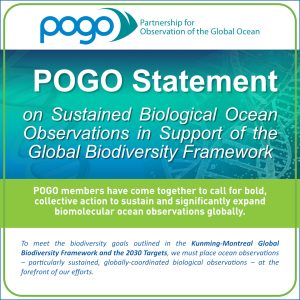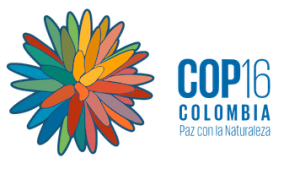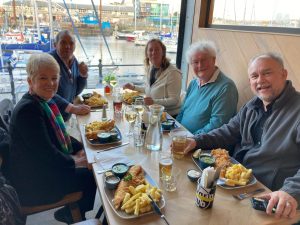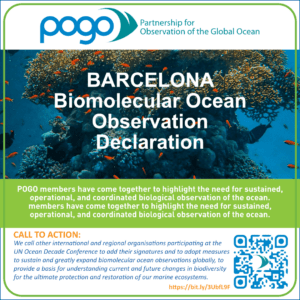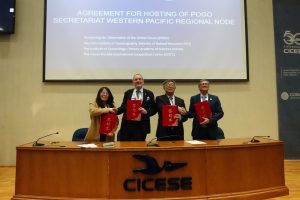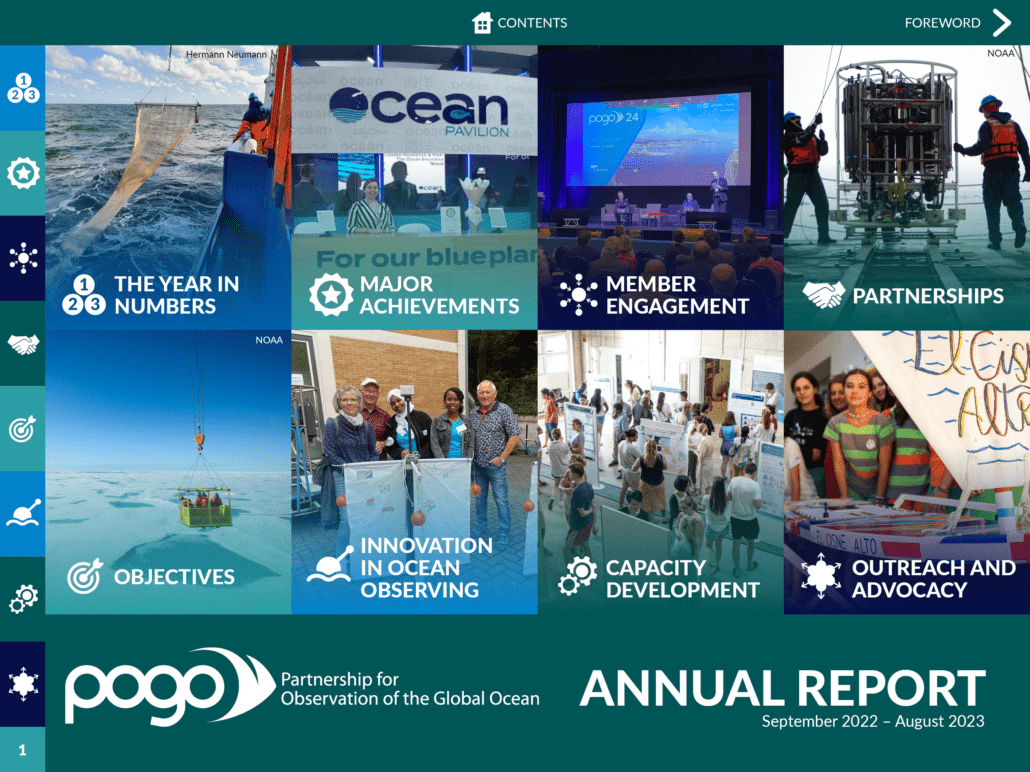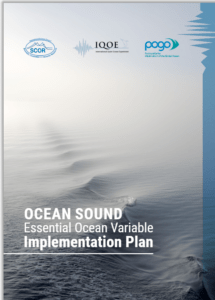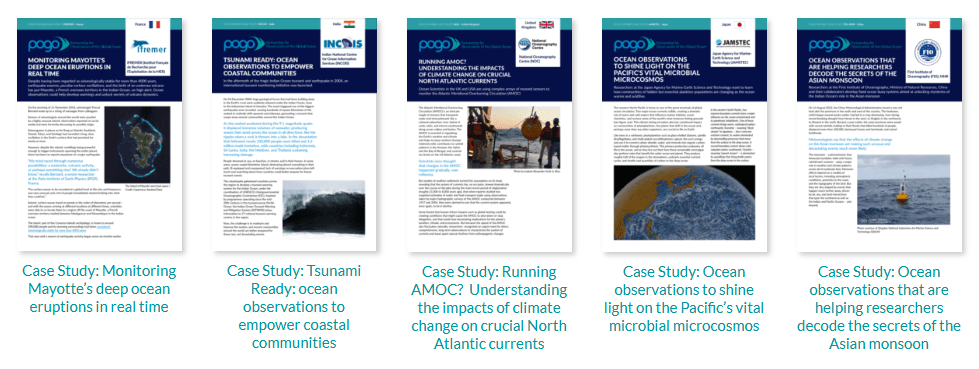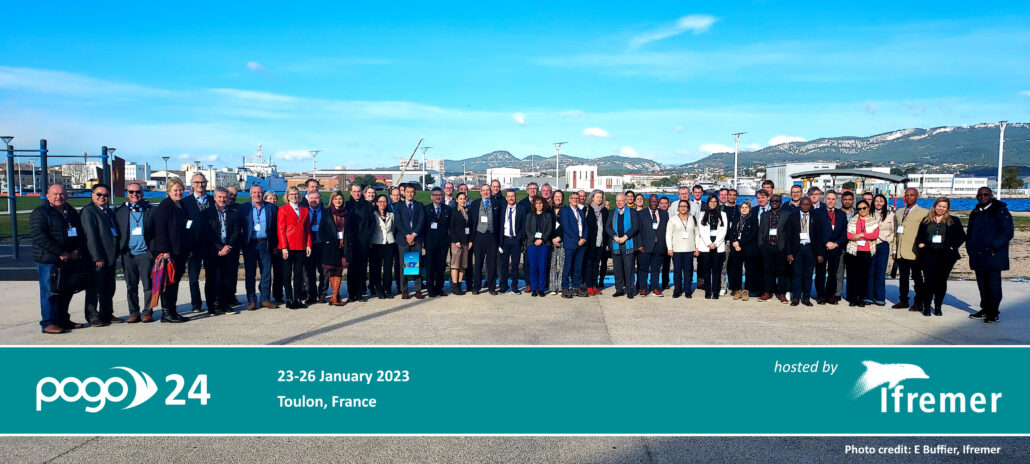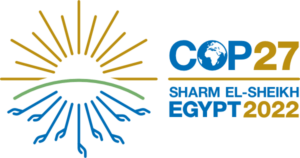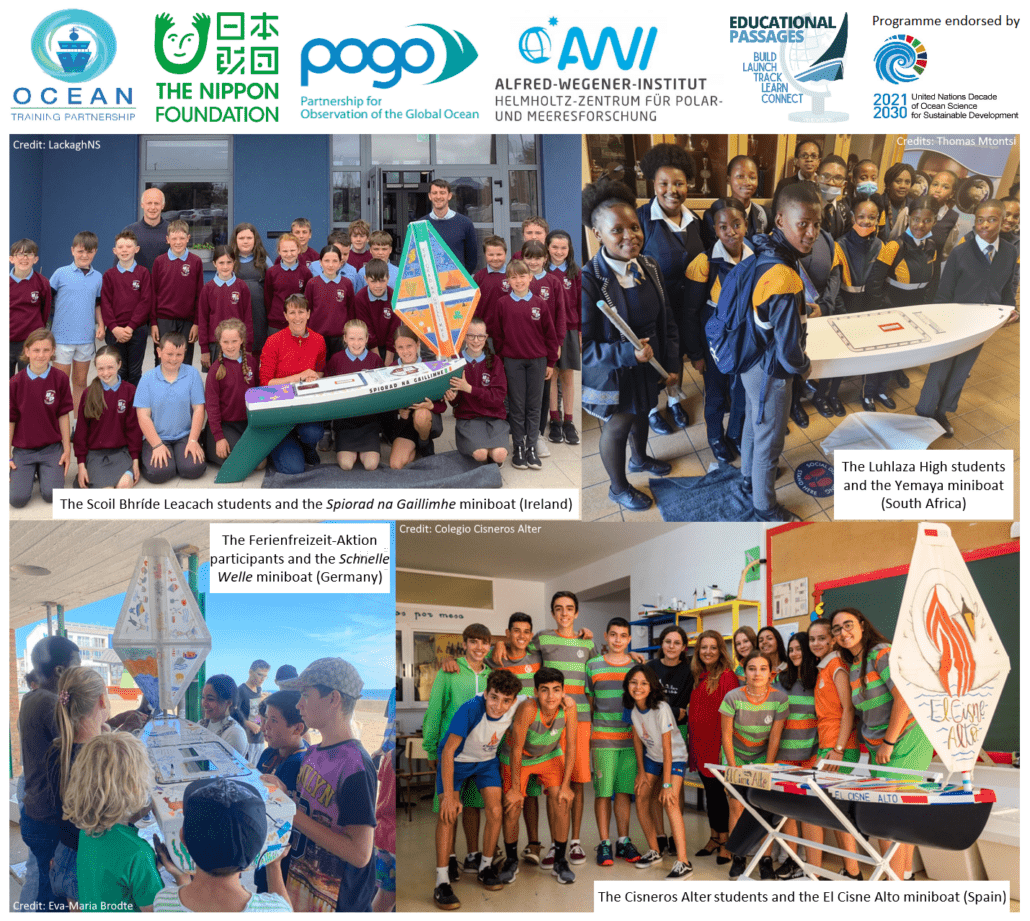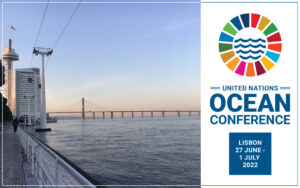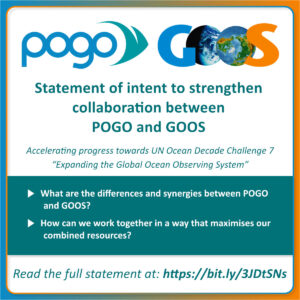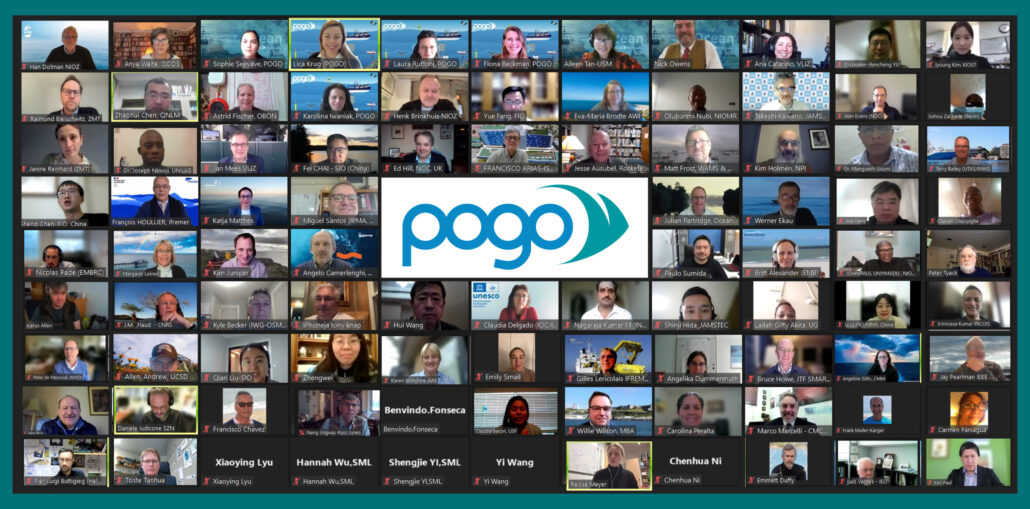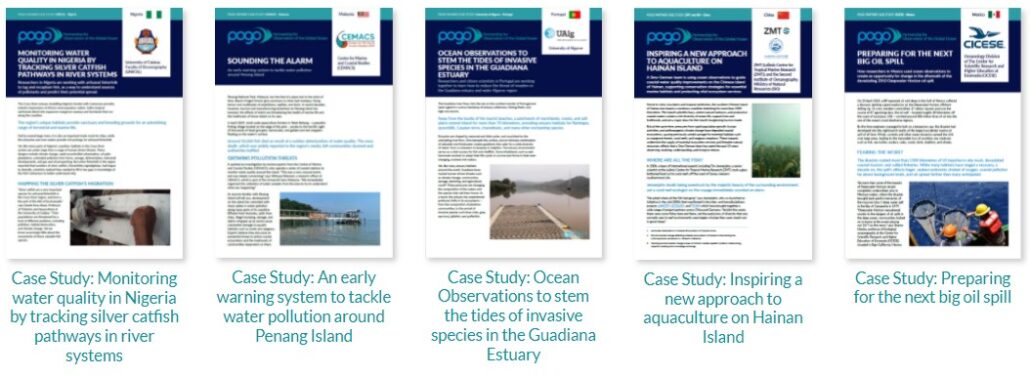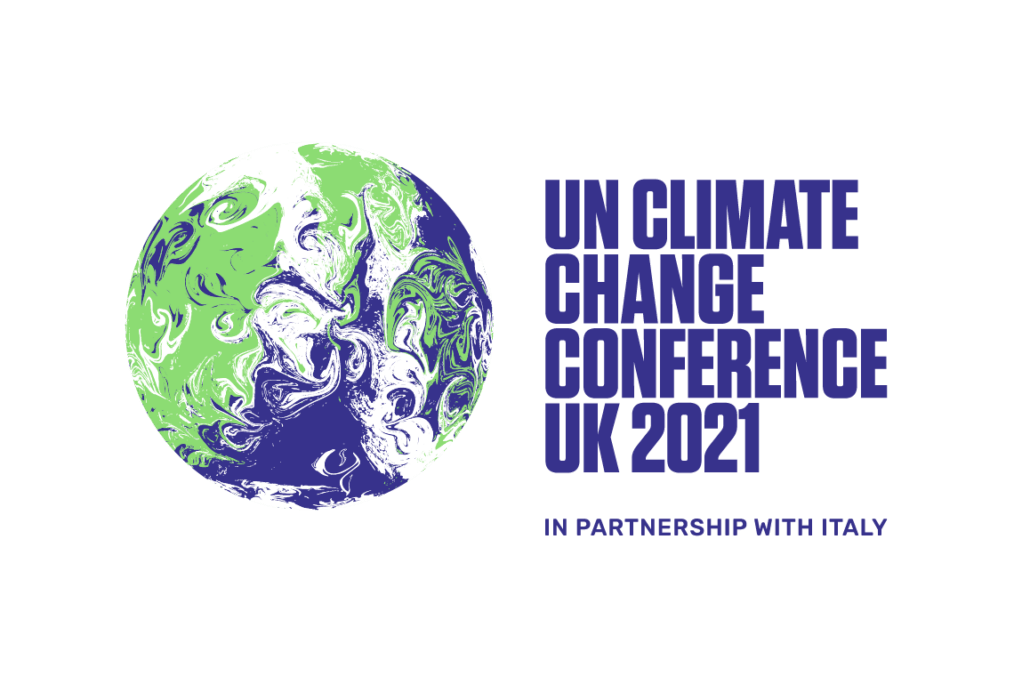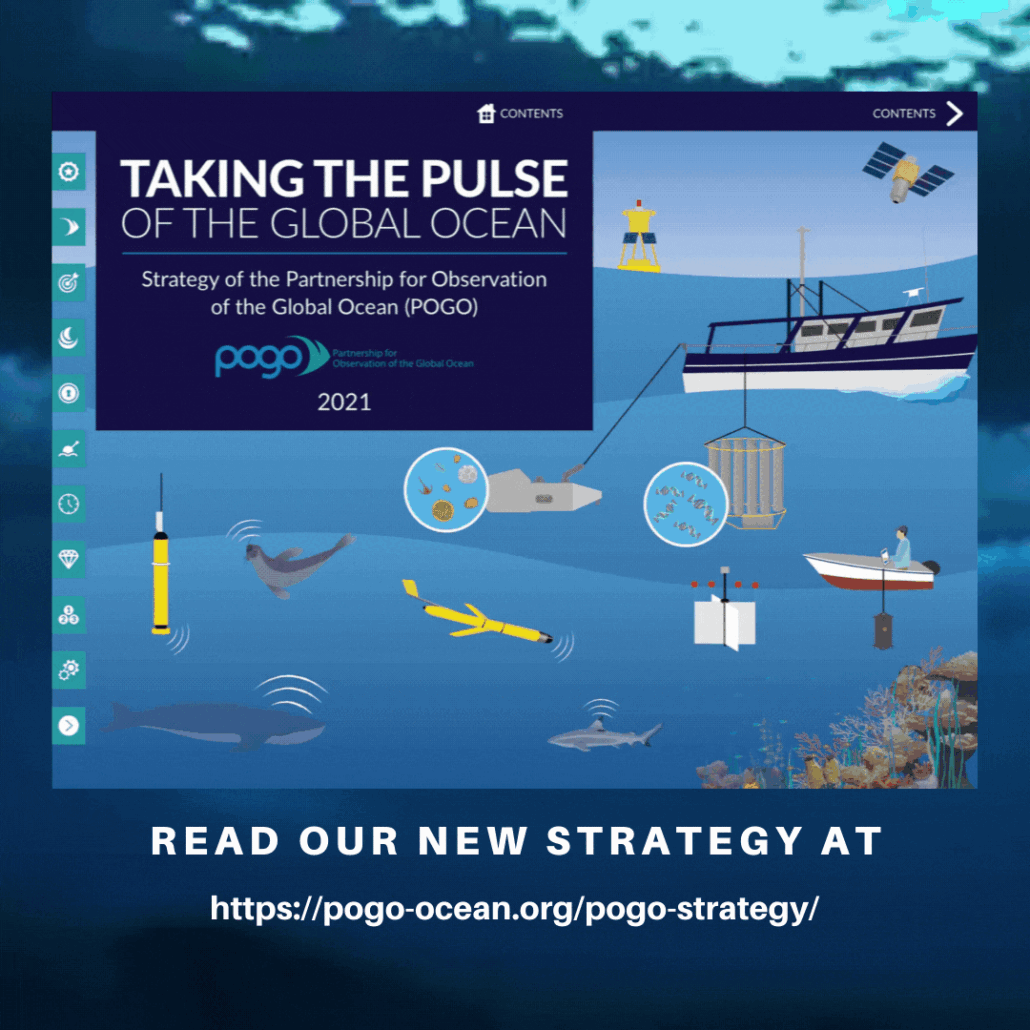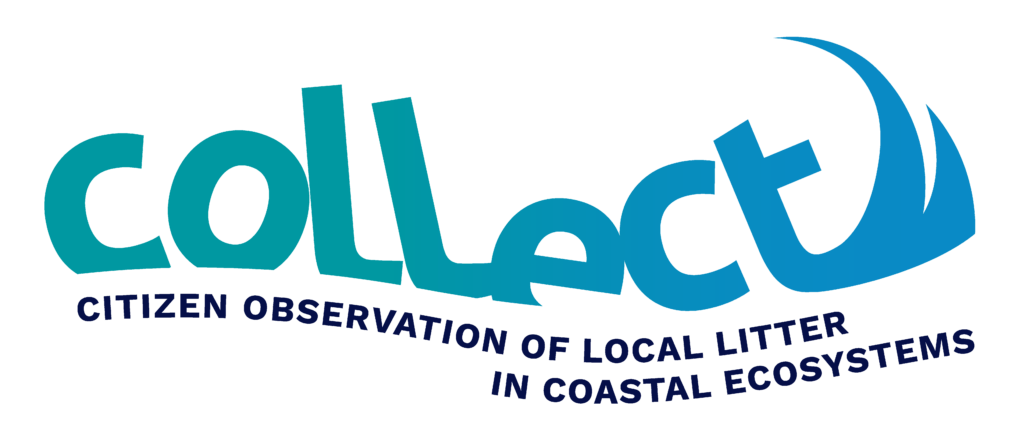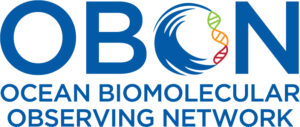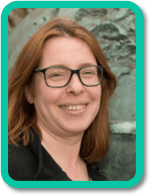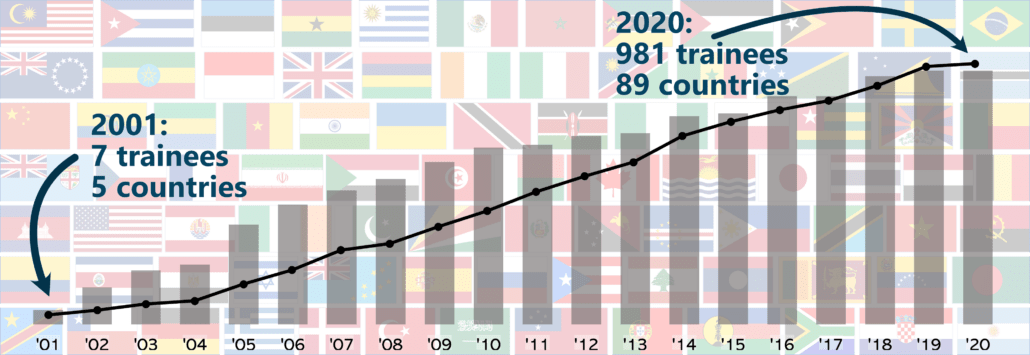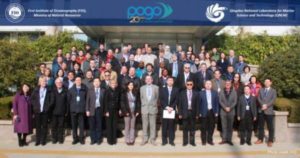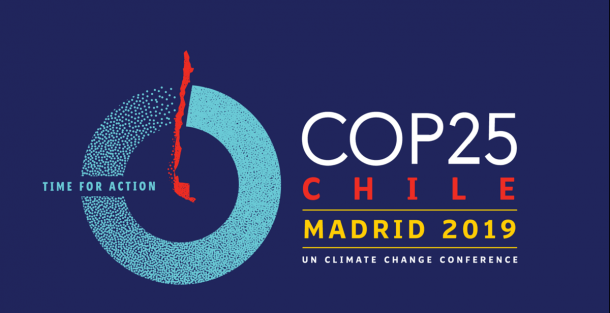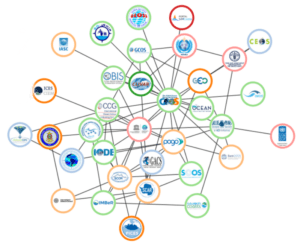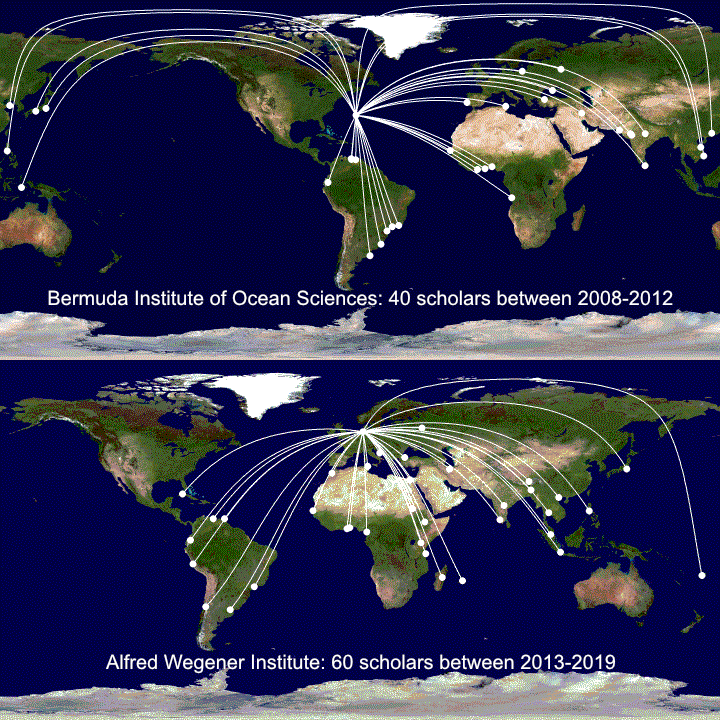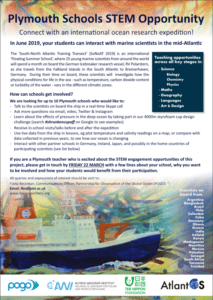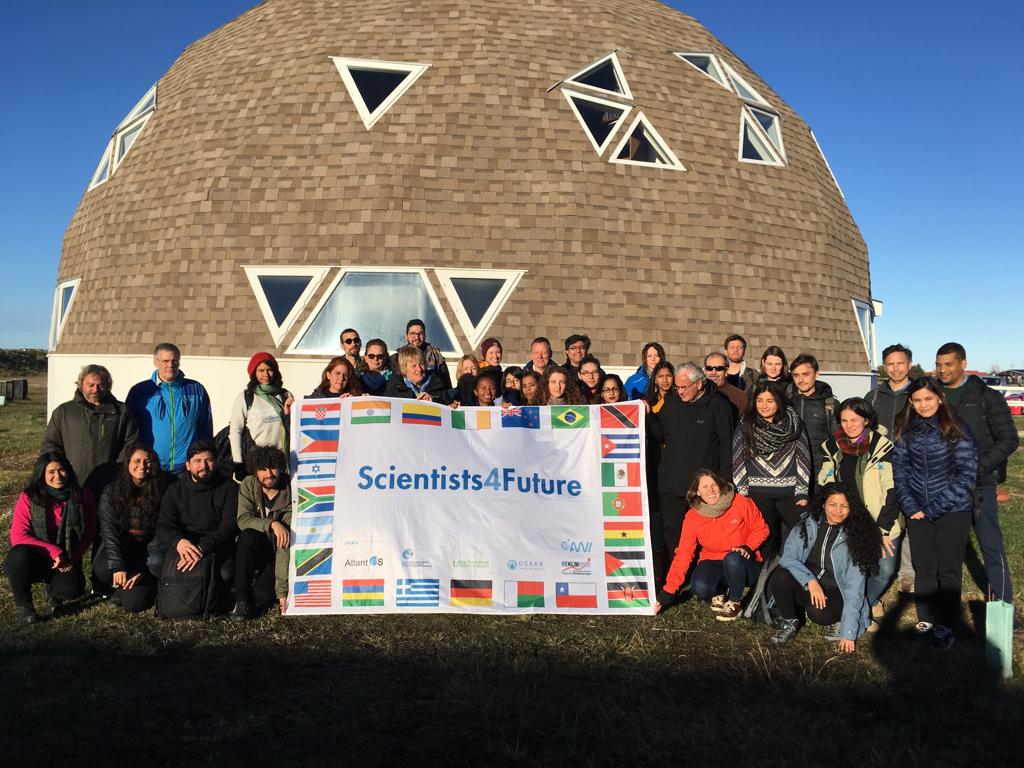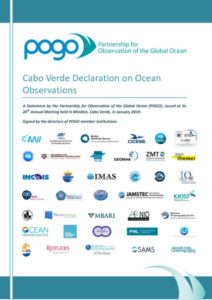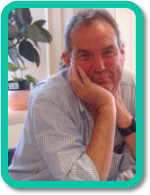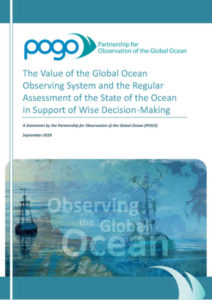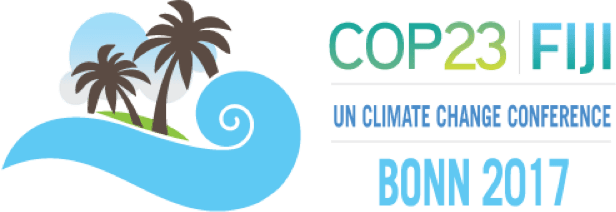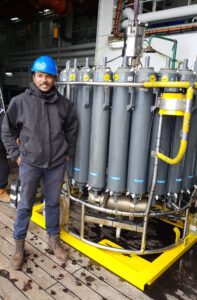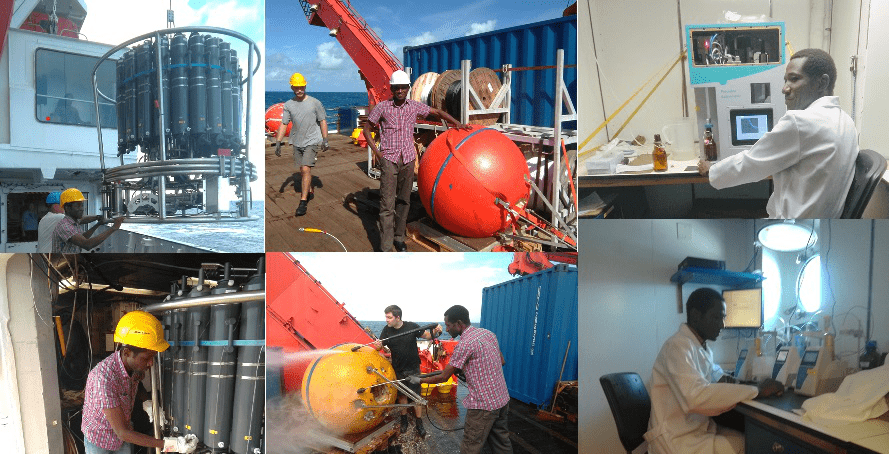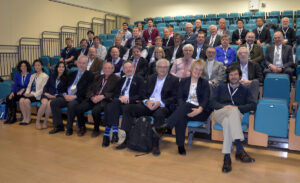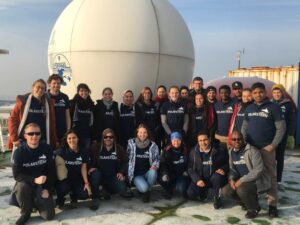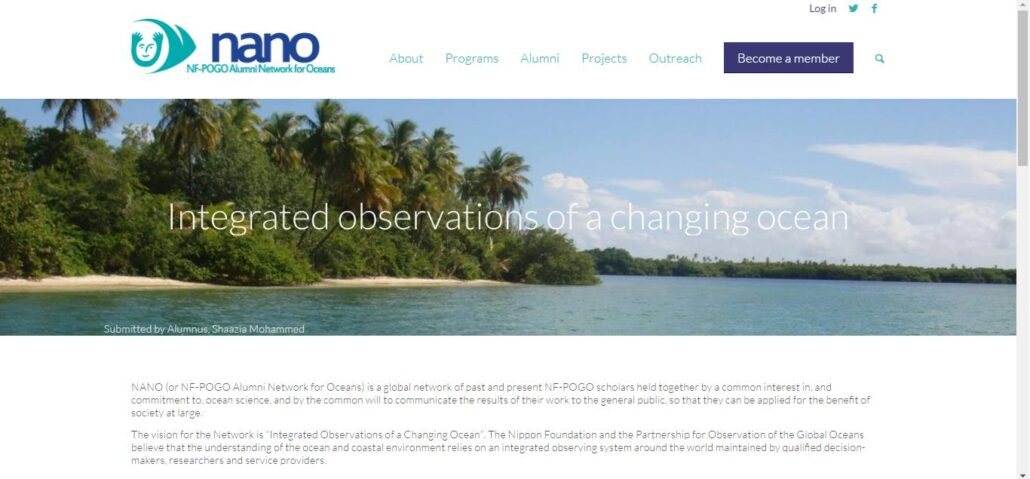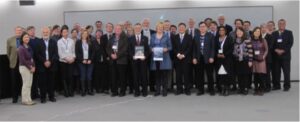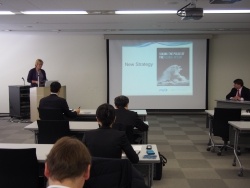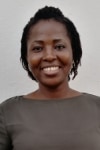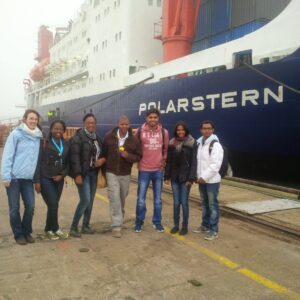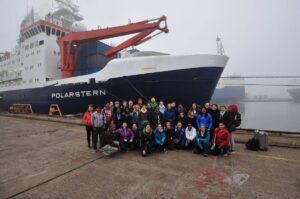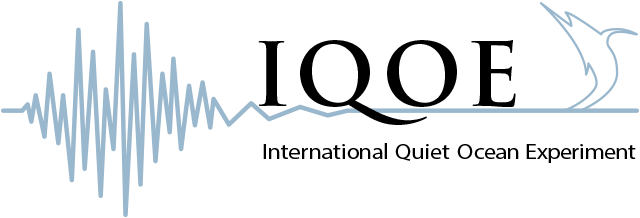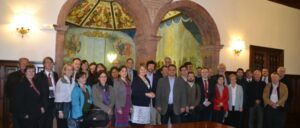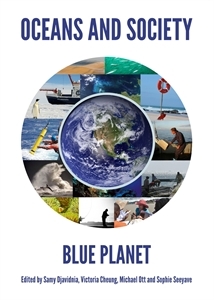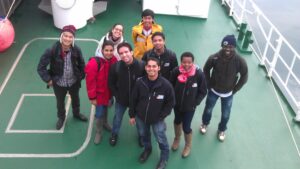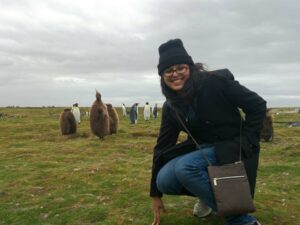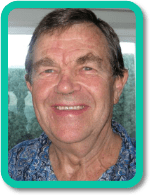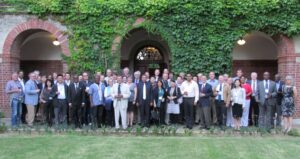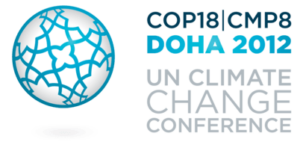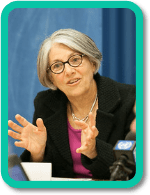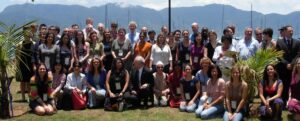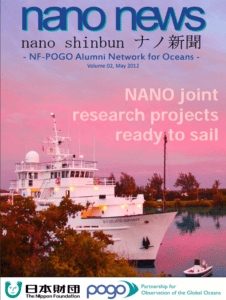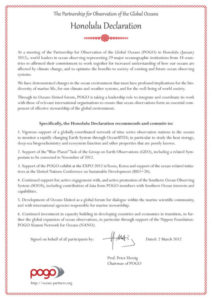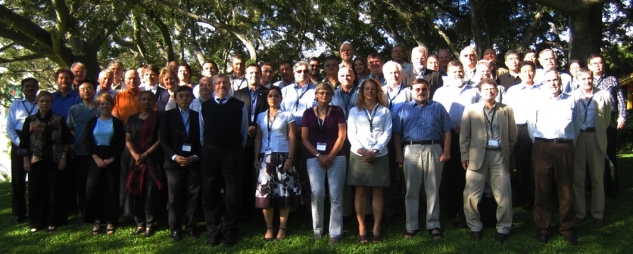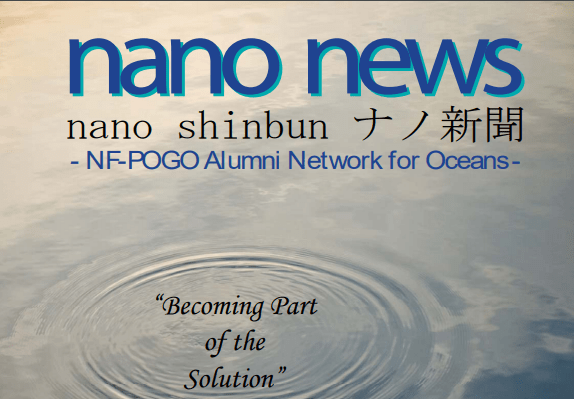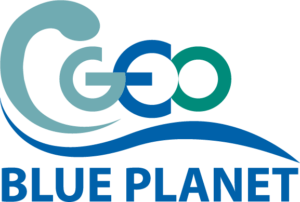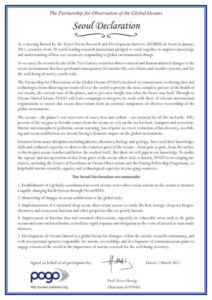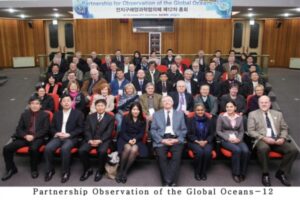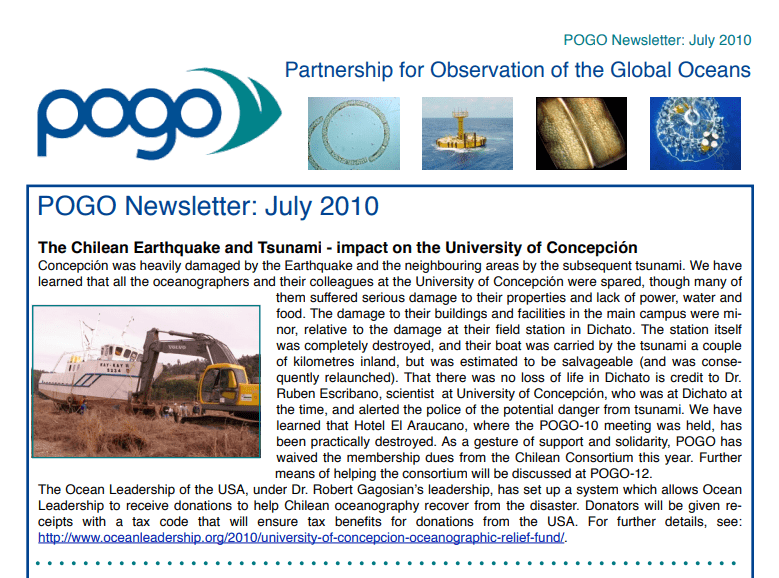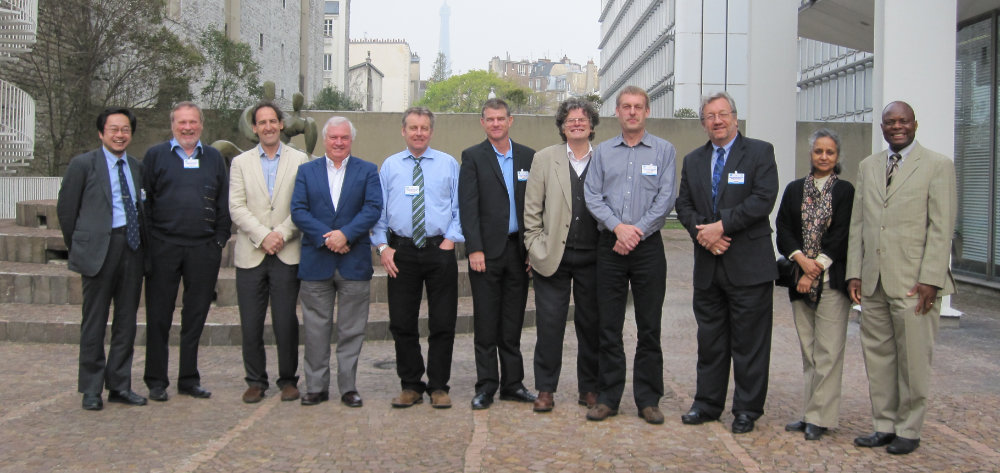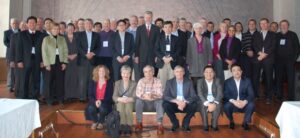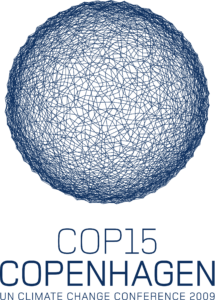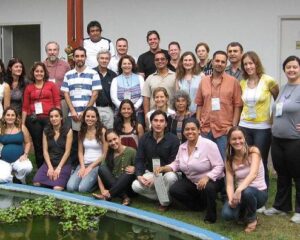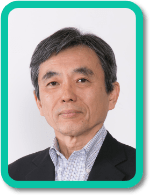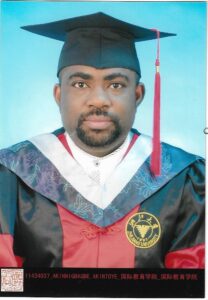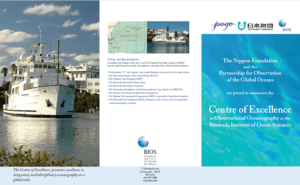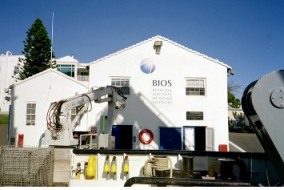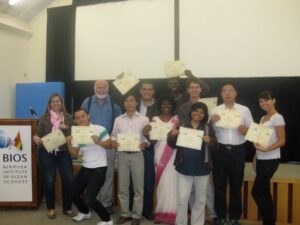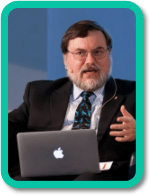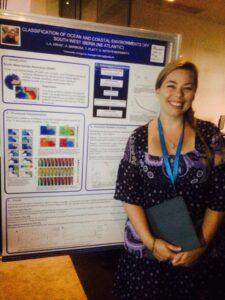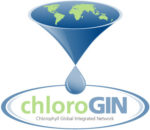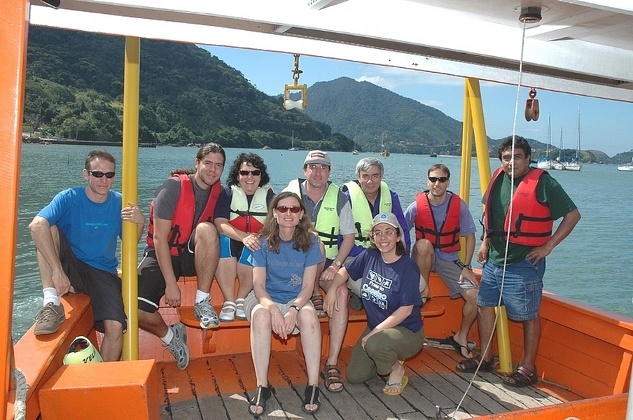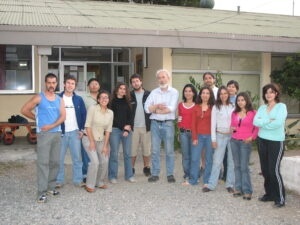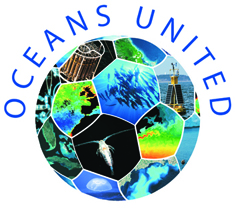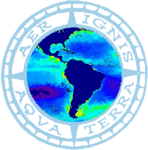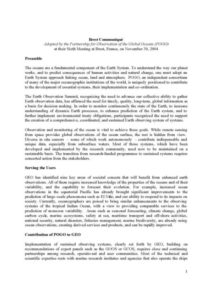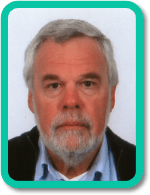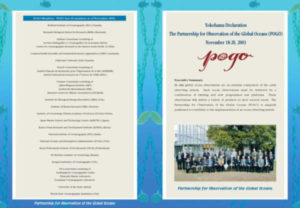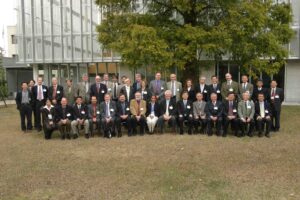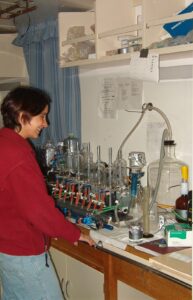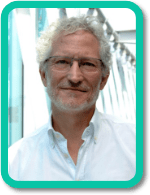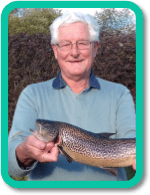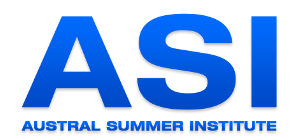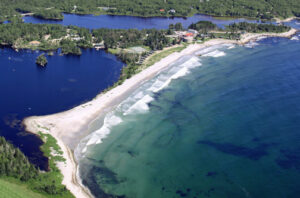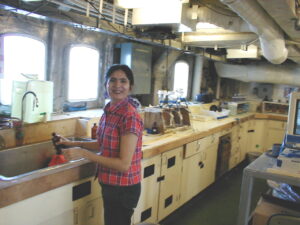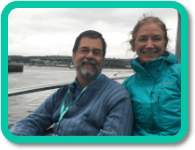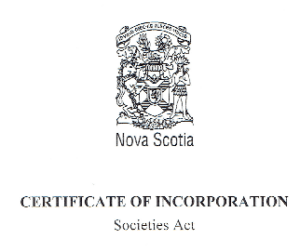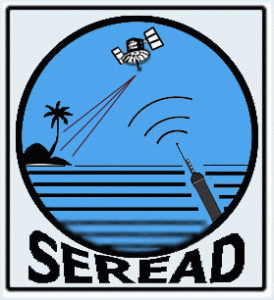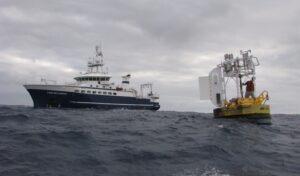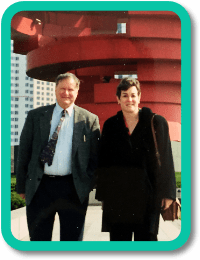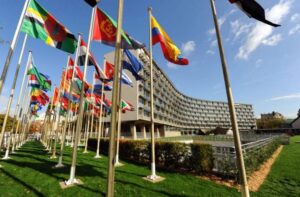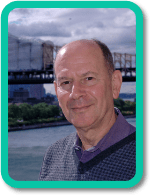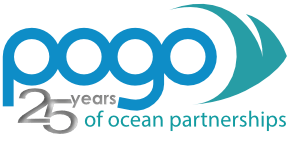
A History of POGO
MEMBERSHIP: 55 institutions in 31 countries
POGO established a new partnership with OceanX and OceanQuest to provide training opportunities for Early Career Ocean Professionals aboard the OceanXplorer – one of the most advanced research and exploration vessels in the world – as part of the UN Ocean Decade-endorsed ‘Around Africa Expedition‘ (Jan-Jun 2025). POGO scholars participated in several legs of the cruise. POGO also worked with OBON, GOA-ON, and The Ocean Foundation to help provide trainers and materials for eDNA and Ocean Acidification work during the voyage.
COP29 (29th Annual Conference of the Parties to the 1992 United Nations Framework Convention on Climate Change (UNFCCC)) took place in Baku, Azerbaijan from 11 to 22 November, 2024
POGO participated in the conference via several channels: (1) hosting an official side event, (2) hosting a official exhibit, and (3) speaking in other sessions
Phase IV of the NF-POGO Centre of Excellence in Observational Oceanography (CofE) formally launched on 24 October 2024, hosted by the Ocean Frontier Institute, in partnership by the Faculty of Open Learning and Career Development, Dalhousie University, the Fisheries and Marine Institute of Memorial University, and the Hakai Institute.
As POGO convened at the 16th Conference of the Parties (CBD16) in Cali, Colombia, it issued a follow-up to the April 2024 Barcelona Declaration:
To meet the biodiversity goals outlined in the Kunming-Montreal Global Biodiversity Framework and the 2030 Targets, we must place ocean observations – particularly sustained, globally-coordinated biological observations – at the forefront of our efforts.
CBD COP16 (Sixteenth meeting of the Conference of the Parties to the Convention on Biological Diversity) will take place in Cali, Colombia from 21 October to 1 November, 2024
POGO participated in the conference via several channels: (1) Expo stand, (2) hosting a side-event, (3) participating in other side events, (4) POGO-led statement on biomolecular observations
In 2023, the POGO Board of Trustees appointed an External Review Panel consisting of 6 experts, selected to represent a range of POGO stakeholders including the marine science community (POGO members and non-members), representatives of other international or regional organisations, and other stakeholders. The report and recommendations were presented to the POGO Board in June 2024, and to the Members on August 2024.
Ahead of the UN Ocean Decade Conference in Barcelona from 10th to 12th April 2024, POGO members came together to highlight the need for sustained, operational, and coordinated biological observation of the ocean, taking advantage of the recent development and expansion of biomolecular observation technologies and initiatives.
The first official regional node of POGO – the Western Pacific Regional Node – is jointly hosted by the First Institute of Oceanography, the Ministry of Natural Resources (FIO), the Institute of Oceanology, the Chinese Academy of Sciences (IOCAS), and the Ocean Decade International Cooperation Center (ODCC), and located at Qingdao, China.
The POGO-25 meeting was hosted by CICESE in Ensenada, Mexico, from 22-25 January 2024.
Captain Francisco Armando Arias-Isaza succeeds Nicholas Owens as Chair of POGO
MEMBERSHIP: 56 institutions in 31 countries
COP28 (28th Annual Conference of the Parties to the 1992 United Nations Framework Convention on Climate Change (UNFCCC)) took place in Dubai, United Arab Emirates, from 30 November – 12 December 2023.
POGO participated in the conference through several channels: (1) hosting an official side event, (2) hosting a official exhibit, and (3) speaking in other sessions, (4) the Virtual Ocean Pavilion, (5) Dubai Ocean Declaration
The International Quiet Ocean Experiment (IQOE), sponsored by SCOR and POGO, published the Ocean Sound Essential Ocean Variable (EOV) Implementation Plan, providing a framework for passive acoustic observations that will advance our use of sound to understand the ocean.
Case studies conducted by POGO members in different parts of the world demonstrate real examples of various socio-economic benefits of ocean observing.
In the second phase of the project (2022 & 2023), we added stories on Climate-critical observing and Geohazards.
POGO was endorsed as a UN Ocean Decade Implementing Partner (DIP) on 29 March 2023.
The POGO-24 meeting was hosted by IFREMER (Institut Français de Recherche pour l’Exploitation de la MER) in Toulon, France, from 23-26 January 2023.
MEMBERSHIP: 55 institutions in 29 countries
Since its registration as a UK Charitable Incorporated Organisation in 2018, POGO has submitted Trustees’ Annual Reports to the Charity Commission, but 2022 saw our first publication of a more visual and interactive version of it for our members, collaborators and the community at large.
The 27th Climate Change Meeting (UNFCCC COP27) was held in Sharm El-Sheikh, Egypt, from 6-18 November 2022.
POGO participated in the conference through four main channels: (1) the Ocean Pavilion, (2) hosting an official side event, (3) hosting a official exhibit, and (4) speaking in other sessions
In August, four miniboats were launched in the Atlantic as part of an outreach project led by POGO, Educational Passages, and AWI. The project involved the NoSoAT 2022 scholars, local partners in Ireland (NUI Galway), Germany (AWI), Spain (CSIC IEO) and South Africa (SAEON), and schools in each of these locations.
The second United Nations Ocean Conference was co-hosted by the Governments of Kenya and Portugal, in Lison, Portugal, in June 2022.
POGO participated in person and virtually, and co-hosted two side events on Capacity Development and Biomolecular Observations. In addition, the Secretariat coordinated a written statement on behalf of the members and submitted this during the conference, which is available here: https://www.un.org/en/conferences/ocean2022/preparation/stakeholders
Accelerating progress towards UN Ocean Decade Challenge 7: “Expanding the Global Ocean Observing System”
At the 23rd Annual Meeting of the Partnership for Observation of the Global Ocean (POGO), held virtually from 24th to 27th January 2022, the members of POGO and Co-Chairs of the Global Ocean Observing System (GOOS) discussed how to better define the differences as well as the synergies between POGO and GOOS, in order to develop a plan for more effective collaboration and maximised use of each organisation’s resources. The following statement of intent to work more closely together was agreed as an outcome of the session.
The POGO-23 meeting took place as a virtual event from 24-28 January 2022.
MEMBERSHIP: 54 institutions in 29 countries
Case studies conducted by POGO members in different parts of the world demonstrate real examples of various socio-economic benefits of ocean observing.
In the first phase of the project (2021), five case studies focused on different approaches to Coastal Water Quality Monitoring in Malaysia, Nigeria, Portugal, China and Mexico.
The 26th United Nations Climate Change Meeting, UNFCCC COP26, was held as a hybrid meeting in Glasgow, UK, and online, in November 2021.
POGO had a virtual exhibit booth, staffed online by the Secretariat. We also co-hosted a side event, entitled, ” Ocean solutions: Coordination and collaboration for ocean-based mitigation and adaptation”.
In October 2021, POGO launched its new, interactive 5-year strategy document.
The purpose of this strategy is to look forward to POGO’s priorities for future years.
It describes who we are, what we want, and what we aim to do – updating our previous strategic document to take into account the current international context, including the UN Decade of Ocean Science for Sustainable Development and the part that POGO and its members are playing within it. Read more…
The COLLECT project, which stands for Citizen Observation of Local Litter in Coastal ECosysTems, is a citizen science study funded by the Richard Lounsbery Foundation (USA). The goal is to actively involve the local community in raising awareness of the consequences of plastic pollution, which can not only damage the environment, but can also have a negative economic impact when it accumulates in the ocean and coastal areas.
In June, the IOC announced that POGO’s Ocean Biomolecular Observing Network (OBON) was endorsed as a Decade Programme for the United Nations Decade of Ocean Science for Sustainable Development. OBON was formed as a result of the International Virtual Conference on the use of Environmental DNA (eDNA) in Marine Environments: Opportunities and Challenges, held virtually in December 2020.
In February 2021, we launched our new video, which was created to mark the end of POGO’s 20th Anniversary celebrations, and to highlight some of our key achievements during those 2 decades.
Thank you so much to everyone who contributed (credits at the end) – it was truly a global effort!
The POGO-22 meeting took place as a virtual event from 25-28 January 2021.
MEMBERSHIP: 53 institutions in 28 countries
“When I first encountered the name of the capacity development programme the “Nippon Foundation-POGO – Centre of Excellence”, I had no idea what an integral part of my life this programme would become. As the scientific coordinator, each beginning of the new teaching year and the end of the previous year are both a consistent aspect and an exciting challenge: friends to say good-bye to, new people to meet. Read more…
by Monica Sorondo and Silvio Pantoja (UNESCO Chair in Coastal Oceanography), Austral Summer Institute (ASI)
The Austral Summer Institute (ASI) has been hosted by Universidad de Concepción, in Concepción, Chile, and carried out every January since 2001. ASI is the academic umbrella for a series of international courses in oceanography. To date, 1.100 students -ranging from advanced undergraduate participants to early careers scientists- coming from 24 countries have taken part in the ASI activities, joining 187 renowned visiting lecturers coming from 16 countries. It is relevant to point out that beyond its role in supporting high-level education and capacity building, ASI has proven to be a most useful tool in the establishment of long-term collaboration projects and further training. Read more…

As of July 2020, POGO has awarded a total of 981 Fellowships in 89 countries.
The total number of individuals trained is 905, with several fellows having participated in more than one type of training.
The POGO-21 meeting was co-hosted by the First Institute of Oceanography (FIO), Ministry of Natural Resources, and Qingdao National Laboratory for Marine Science and Technology (QNLM) in Qingdao, China, from 20-22 January 2020.
MEMBERSHIP: 48 institutions in 28 countries
December 2019 marked the 20th anniversary of the first POGO Annual meeting, which was held at Scripps Institution of Oceanography, La Jolla, California, USA from 1-3 December 1999.
POGO’s exhibition booth, entitled ‘POGO – Observing our Ocean’, presented the ‘Three Pillars’ of POGO’s Mission: Developing capacity, innovative technology and international partnerships towards world-wide cooperation for a sustainable, state-of-the-art global ocean observing system which will serve the needs of science and society by supporting climate research and decision making.
During the OceanObs’19 conference in Hawaii, POGO and GEO Blue Planet launched the Oceanscape Portal, a joint initiative to identify existing and create new partnerships among the ocean observing community.
All members of the ocean community are invited to participate by adding new “organisations”, which can include intergovernmental organisations, NGOs, private foundations, programmes/projects, companies, trade associations and others – the idea is to make this as inclusive and as useful as possible.
You can find out more about the Oceanscape project, and how to add a new entry in the launch announcement.
POGO participation in OceanObs ’19 (Honolulu, USA) – exhibition stand, session co-organiser and co-author of several White Papers
In July 2019 we reached the milestone of 100 scholars trained by the NF-POGO Centre of Excellence.
Early career researchers from 42 countries were trained in Observational Oceanography by the NF-POGO CofE at the Bermuda Institute of Ocean Sciences (40 scholars between 2008-2012) and at the Alfred Wegener Institute (60 scholars between 2013-2019).
The 2019 World Ocean Day was dedicated to gender and the ocean. To celebrate the day, a UNESCO project honoured women whose scientific work is enhancing the conservation of the 49 marine sites inscribed on the World Heritage List. In this video, former POGO Chair, Karen Wiltshire, talks about the Wadden Sea, which extends along the coasts of Denmark, Germany and the Netherlands.
[embedyt] https://www.youtube.com/watch?v=dtlAhSidmlI[/embedyt]
In 2019, POGO was involved in a major shipboard outreach initiative conducted during the South-North Atlantic training Transect (SoNoAT).
Outreach activities within the SoNoAT included Skype sessions, blog posts and social media interactions. Skype sessions involved thirteen schools in five countries (two in Germany, eight in the UK, one in Ireland, one in Brazil and one in Japan) and a climate conference (Klimakonferenz Wir.Machen.Klima.) in Germany. It is estimated that these audiences included over 250 school children from ages between nine and 18 years old.
The third Atlantic Transect Floating Summer School – the ‘South-North Atlantic Training Transect’ (SoNoAT) cruise – took place on board the RV Polarstern in June 2019.
The training cruise involved 23 young scientists and 15 experts from 25 nations, travelling from Port Stanley in the Falkland Islands to Bremerhaven in Germany over four weeks, and was the focus of a major schools outreach project.
The training was supported by POGO, The Nippon Foundation, Japan and the Alfred Wegener Institute.
A Statement by the Partnership for Observation of the Global Ocean (POGO), issued at its 20th Annual Meeting held in Mindelo, Cabo Verde, in January 2019.
Call to Action:
We call on all governments, as well as funders and stakeholders worldwide, to support ocean science institutions in Africa, Small Island Developing States, and other parts of the developing world to participate fully in global endeavours to measure and understand changes in their regional and local marine environments. Read more…
– POGO Member and POGO Chair (2019-2024) –
“It is nearly 19 years since I first became involved in POGO – I attended POGO 3 at the White Point beach resort in Nova Scotia. I recall the meeting extremely well for lots of reasons. Firstly, it was when I first met Charlie Kennel – the POGO Chair, who I thought was inspirational. Secondly, although I had met Shubha Sathyendranath on a number of occasions previously, this POGO meeting afforded me an opportunity to see Shubha display her consummate and quiet organisational skills for the first time, which still continues to impress and inspire me. Read more…
The POGO-20 meeting was hosted by the Instituto Nacional de Desenvolvimento das Pescas (INDP) and the GEOMAR Helmholtz Centre for Ocean Research Kiel at the Ocean Science Centre Mindelo (OSCM), in Cabo Verde, from 22-24 January 2019.
Nicholas Owens succeeds Karen Wiltshire as Chair of POGO
MEMBERSHIP: 42 institutions in 25 countries
A POGO delegation attended COP24 (24th Annual Conference of the Parties to the 1992 United Nations Framework Convention on Climate Change (UNFCCC)) in Katowice, Poland, from 3-14 December 2018.
In September 2018, POGO issued a Consensus Statement on the importance and value of ocean observations, for both science and society.
This Statement reflects the agreement by the Directors of 38 major oceanographic institutions from around the world, to highlight the need for sustained support for ocean observations, their international coordination through a fully operational Global Ocean Observing system (GOOS), and particularly the role of GOOS in supporting the World Ocean Assessment, which is led by the United Nations and currently entering its second cycle.
 The 4th GEO Blue Planet Symposium was held from 4 – 6 July 2018 in Toulouse, France, hosted by Mercator Oceans International and organised as a side event of the European Open Science Forum (ESOF). The focus was on ocean and coastal information needs for sustainable development, Blue Growth and societal awareness, and involved a number of POGO members and NANO alumni.
The 4th GEO Blue Planet Symposium was held from 4 – 6 July 2018 in Toulouse, France, hosted by Mercator Oceans International and organised as a side event of the European Open Science Forum (ESOF). The focus was on ocean and coastal information needs for sustainable development, Blue Growth and societal awareness, and involved a number of POGO members and NANO alumni.
Read more in this Article from POGO Newsletter Issue 33
NANO Global Project “A Global Study of Coastal Productivity, Deoxygenation and Ocean Acidification”– Workshop
Between 2012 and 2017, with the support of NF and POGO, NANO members successfully conducted joint regional research projects that tackled coastal monitoring related to different subjects (e.g., HABs, tides and currents, invasive species) ultimately, applying ocean observations for societal benefit. These served as inspiration for a new NANO initiative – a joint project of global scale. The NANO Global project aims to monitor productivity, deoxygenation and acidification in coastal areas with an expanded geographical coverage, taking advantage of the distribution of NANO members around the globe and the facilities provided by their home institutions (e.g., monitoring capabilities, on-going projects, existing datasets and instrumentation). In 2017, a survey conducted among NANO members indicated a total of 36 marine scientists, technicians and graduate students, representing 14 countries and 18 institutions, interested in joining the project.
Representatives of these groups, members of the POGO Secretariat and NANO friends met in Lisbon, Portugal, between 18 and 20 April. The workshop included an introduction to the project objectives, presentations on the results of the survey and on current sampling strategies conducted in the participants’ institutions. The workshop also included talks on oceanographic data acquisition and management.
The Earth has one big ocean with many features
The linked video was produced by Marine CoLAB as part of their #DropTheS campaign in 2019.
The POGO-19 meeting took place in La Jolla, California, USA, from 23-25 January 2018. The meeting was hosted by Scripps Institution of Oceanography.
MEMBERSHIP: 36 institutions in 19 countries
The Ocean Training Partnership is an initiative led by POGO in collaboration with the Strategic Marine Alliance for Research and Training (SMART) and the AWI. The project is funded by the Nippon Foundation and hosted by Marinetraining.eu.
The objective of the Ocean Training Partnership is to pool infrastruture, resources and expertise to provide marine science graduates with offshore technical skills and experience onboard research vessels whilst building capacity in ocean observations.
and a delegation attends COP23 (Bonn, Germany); POGO partners with PML for the design and manning of an exhibition stand.
POGO Alumnus:
NF-POGO Shipboard Training – 27th AMT
“The NF-POGO experience and the shipboard training on the 27th Atlantic Meridional Transect (AMT) research cruise was a great opportunity for me to acquire an immense knowledge and skills on pre-cruise preparation, conducting scientific experiments on board…
“Moreover, this programme provided an opportunity to interact with other experienced scientists who are experts in the area of oceanography and marine biogeochemistry. Learning from these scientists and their guidance is an inspiration for me to enhance the quality of my future research activities. In addition, I was able to share the knowledge I gained from this training among the students and colleagues at my institution, and inspired them on marine research.”
POGO Alumnus:
(1) POGO-SCOR Visiting Fellowship; (2) NF-POGO Shipboard Training
“…the positive role POGO has played in the career of early career researchers, like me, from the developing in the last two decades of her existence cannot be overstated. All the opportunities would not have been possible without the sponsorship from the POGO and her partners. I, therefore, commend POGO for the good work and encourage her to keep the good work as she starts another milestone. Long live, POGO!”
The 3rd Blue Planet Symposium was held in College Park, Maryland, USA from 31 May to 2 June 2017. The symposium was co-hosted by the National Oceanic and Atmospheric Administration, the University of Maryland and the University System of Maryland Foundation. The symposium served as a forum for discussion of societal information needs resulting from the important role the oceans play in Earth’s life-support system and the challenge of minimizing the impacts of human activities on the oceans while utilizing the resources of the oceans to meet our needs. The symposium also served as a platform for the participating communities to exchange information on their activities and discuss potential pilot and prototype projects for Blue Planet to focus on in the coming years.
In Feb 2017, POGO registered as a UK CIO, registered and regulated by the Charity Commission of England and Wales, No 1171692. We transitioned over to a UK legal entity on 1st July 2018.
The POGO-18 meeting was hosted by Plymouth Marine Laboratory (PML), United Kingdom from 24-26 January 2017.
MEMBERSHIP: 37 institutions in 20 countries
The second “Floating Summer School” took place from Bremerhaven via Las Palmas to Cape Town (South Africa) in November-December 2016. An international group of 25 students was trained in basic techniques of oceanography and remote sensing. The participants learnt how to take samples, how to process them and deal with the accompanying data. The main water masses between the North Sea and Cape Town were characterized in terms of their hydrographic features down to a depth of approx. 500 m. A further focus during the transit cruise was physical and chemical measurements for energy and material exchange between ocean and atmosphere. In addition, the students received an introduction to the physics of the climate system, international climate negotiations and the law of the sea and its impacts on marine research activities.
NoSoAT was a joint project between the Alfred Wegener Institute, NF-POGO and the Irish Strategic Marine Alliance for Research & Training (SMART) program. It was funded by the Nippon Foundation through the NF-POGO Centre of Excellence and supported by REKLIM. NF-POGO provided travel grants to 11 scholars from Argentina, Egypt, Ethiopia, Kenya, Madagascar, Mexico, Nigeria, the Philippines, the Russian Federation and South Africa.
After 4 years using the Wikispaces platform, in May 2016 NANO upgraded its website to a more user-friendly, modern looking platform. The new website includes embedded video and photo galleries, allows partial access (members-only) to reports and information and permits alumni to control what is visible to others in their own profile pages.
Links to social media and regular posts of opportunities and news in ocean sciences ensure over 3000 views per month.
The POGO-17 meeting was hosted by the Japan Agency for Marine-Earth Science and Technology (JAMSTEC), in Yokohama, from 26-28 January 2016.
MEMBERSHIP: 37 institutions in 21 countries
Press Release
25 January 2016 – The Partnership for Observation of the Global Oceans (POGO) presented the new observational strategy at a press conference in Tokyo, Japan today ahead of the annual meeting of the organisation, which brings together the directors of 40 oceanographic institutions from around the world. Read more…
POGO Alumnus:
NF-POGO-AWI Shipboard Training (NoSoAT), 2015
“Africa suffers a brain drain and the reason is simple: A lot of the continent’s young talented scientists would rather emigrate to the North to fully develop their research career and contribute significantly to addressing challenges that are outside of the African continent rather than remain on the continent and face career uncertainties. Personally, I recount how I got frustrated as a young returnee marine scientist to Ghana who had gone to train in one of the best marine research laboratories in the world, the Moss Landing Marine Laboratories in the United States of America.”
POGO Alumnus:
NF-POGO-AWI Shipboard Training (NoSoAT), 2015
“My journey with POGO and NANO dates back to 2015 when I was the first Mauritian candidate to be selected for the first North to South Atlantic transect from Germany to South Africa on board the Polarstern Research Vessel. It was an incredible and life-changing experience for me. We were 32 candidates from all corners of the globe, chosen out of ~ 500 applicants. Being the first candidate from Mauritius Island to be selected for the first NoSoAT was very humbling and it brought me immense pride and satisfaction to be able to introduce my small paradise island, Mauritius, to all the other fellow participants and to the personnel on board the research vessel.”
In 2015, the first NF-POGO shipboard training in the form of the “Floating Summer School” on the North South Atlantic Transect (NoSoAT) cruise provided training during a five week long transit from Bremerhaven (Germany) to Cape Town (South Africa). In total thirty-four post-graduate students were trained in the principles of oceanography and marine biology onboard the RV Polarstern comprising of lectures, practical exercises and student presentations. Eight of those scholars were supported by NF-POGO.
The training was co-sponsored by AWI, SMART, NF-POGO and Mercator Foundation.
(Photo Credit: Pavanee Annasawmy)
An Open Science Meeting was convened at the IOC headquarters in Paris in 2011 to gather ideas and input from the broader community of scientists, navies, industries and others. A Writing Group was put together to distil the discussions at that meeting into a Science Plan, which was subsequently reviewed and approved by SCOR and POGO, before publication in 2015.
This sets out a plan to address the following fundamental questions:
- How have human activities affected the global ocean soundscape compared with natural changes over geologic time?
- What are the current levels and distribution of anthropogenic sound in the ocean?
- What are the trends in anthropogenic sound levels across the global ocean?
- What are the current effects of anthropogenic sound on important marine animal populations? 5) What are the potential future effects of sound on marine life?
The second Blue Planet symposium for the GEO marine Task SB-01 “Oceans and Society: the Blue Planet” was held in Cairns, Australia from 27 to 29 May 2015. The symposium was co-organised by CSIRO and POGO.
Additional side meetings of the NF-POGO Alumni Network for Oceans and ChloroGIN/SAFARI also took place prior to the symposium.
At its 15th Annual Meeting (Jan 2014), the POGO members decided that POGO needed a more transparent process for allocating support to new or existing projects that approach POGO for support. It was also agreed that POGO would be more effective in advancing ocean observations if it operated through a number of Working Groups dedicated to specific priority areas identified by the members. These must be directly relevant to POGO’s core mission, i.e. sustained, long-term ocean observing systems and shared use of infrastructure, data and information. At the 16th POGO annual meeting (Jan 2015) it was decided that POGO’s funding for training initiatives would be allocated following a similar process, to ensure that the funding is used more effectively to advance POGO’s core mission.
Support has been provided to projects proposed by POGO members, which aim to identify and fill gaps in global ocean observation. A call has been issued to the POGO member institutes annually, to advance ocean observations while at the same time strengthening the ties of the POGO network.
The POGO-16 meeting was hosted by the Instituto Español de Oceanografía (IEO), in Tenerife, Spain, from 27-29 January 2015.
Karen Wiltshire succeeds John Field as Chair of POGO
MEMBERSHIP: 35 institutions in 21 countries
The “Ocean Communicators United” (OCU) Working Group is an informal grouping of representatives of international, regional or national oceanographic research organisations that provides a forum for its members to share information, expertise, best practices and materials related to marine science communications. Read more…
Published in 2014, “Oceans and Society: Blue Planet” is targeted at all stakeholders within the ocean and marine community. The book discusses activities and future actions of Blue Planet and raises awareness for the further development and implementation of the Blue Planet agenda. Readers will learn about ocean observations, how they can be integrated, and their applications to benefit society as a whole. The book is currently available from Cambridge Scholars Publishing.
The book was initiated by Trevor Platt, then Executive Director of POGO, and two other members of the POGO Secretariat served on the Editorial Board.
The POGO-15 meeting was hosted jointly by the Commonwealth Scientific and Industrial Research Organisation (CSIRO) and the Institute of Marine and Antarctic Studies, University of Tasmania (IMAS), in Hobart, Australia, from 22-24 January 2014.
MEMBERSHIP: 35 institutions in 20 countries
POGO Alumnus:
(1) NF-POGO Centre of Excellence 2013-2014; (2) NF-POGO-AWI Shipboard Training – NoSoAT 2016
“‘Tell me and I will forget, show me and I may remember, but let me do and I will understand’ – a Chinese proverb. Hands-on training offers the opportunity to build the foundation of ocean science to the young ocean learners. For last 20 years, POGO is promoting ocean science to the young ocean learners throughout the world by providing hands-on training and transferring technologies. I am fortunate enough to get the opportunities to participate in training programmes and science meetings on oceanography offered by POGO.”
POGO Alumnus:
(1) POGO-AMT Shipboard Training, 2013; (2) POGO-SCOR Visiting Fellowship, 2017
“In 2013, I was awarded the POGO AMT 2013 fellowship to participate on a research cruise from UK to Falkland Islands to carry out in-situ measurements along the Atlantic Meridional Transect (AMT). The fellowship was very well structured into three parts, to prepare for a research cruise, conduct scientific experiments on the cruise and finally process as well as analyse the data collected.”
– POGO member (2000-2015) and POGO Chair (2013-2014) –
“I am very privileged to have been involved with POGO from 2000. This was about when it became widely recognised that satellite oceanography would revolutionise our understanding of surface ocean dynamics. I had been asked to help promote biological observations as part of POGO, which initially had a physical bias. It was inspiring to be at POGO meetings with people like Jesse Ausubel who had promoted the Census of Marine Life so passionately and had the Sloan Foundation co-sponsor the “Biological Observations” workshop in Dartington, England in 2001. Read More…
POGO-14 was hosted by the MArine REsearch Institute (MA-RE), University of Cape Town, South Africa from 22 to 24 January 2013.
John Field succeeds Peter Herzig as Chair of POGO
MEMBERSHIP: 34 institutions in 20 countries
The “Hot, Sour and Breathless – Ocean under stress” awareness campaign, led by PML, was first launched at the COP17 conference (Durban, South Africa, 2011). POGO came on board as a campaign supporter for the COP-18 Conference in Doha, Qatar (2012).
“I have such fond memories of my first interaction with the POGO Team, and the energy that they brought to the importance of integrated oceanic observations. Had it not been for the shared vision and keen collaboration between POGO and NOAA, the Group on Earth Observations (GEO) would not, today, have the Blue Planet Initiative. Congratulations POGO on your 20th Anniversary — an amazing accomplishment in, and of, itself — but also on the many contributions you have provided to the global ocean community.”
A kick-off symposium for the new GEO marine Task SB-01 “Oceans and Society: the Blue Planet” was held in Ilhabela, São Paulo State, Brazil, from November 19 to 21, 2012. The symposium was co-sponsored by the Canadian Space Agency (CSA), GEO, INPE and POGO and took place just prior to the GEO-IX Plenary, held in Foz do Iguaçu, Brazil (November 22 and 23, 2012).
Beginning of 4 NANO regional research projects (Latin America, North West Africa, Indian Subcontinent, Southeast Asia)
(Read introductions to the projects in NANO News Issue 2)
After almost two years of preparations, the POGO exhibit at Expo 2012 Yeosu Korea was opened to the public on 12 May 2012, along with the many other exhibits featured in the 23 pavilions that occupy the imposing 25-hectare Expo site.
The theme of the 2012 International Expo, “the Living Ocean and Coast”, sparked POGO’s interest back in January 2010 when the Expo was first brought up by scientists of the then Korea Ocean Research and Development Institute, KORDI (now Korea Institute of Ocean Science and Technology, KIOST), during the 12th POGO Annual Meeting. Read more…
At a meeting of the Partnership for Observation of the Global Oceans (POGO) in Honolulu (January 2012), world leaders in ocean observing representing 29 major oceanographic institutions from 18 countries re-affirmed their commitment to work together for increased understanding of how our oceans are affected by climate change, and to optimise the benefits to society of existing and future ocean observing systems. Read more…
The POGO-13 Meeting was hosted by the School of Ocean and Earth Science and Technology, University of Hawaii at Manoa, from 9 to 11 January 2012.
MEMBERSHIP: 35 institutions in 21 countries
POGO Alumnus:
(1) NF-POGO Centre of Excellence 2011-2012; (2) POGO-AMT Shipboard Training, 2012
“I am a Brazilian marine biologist specialized in marine phytoplankton ecology. Here I tell my story about how POGO completely changed my professional path and my scientific career through the opportunities, mentorship and motivation offered to developing countries’ ocean science students.”
POGO Alumnus:
NF-POGO Centre of Excellence 2011-2012
“I was selected as a scholar of the Nippon Foundation-POGO Centre of Excellence (NF-POGO CofE) in year of 2011-2012 (Year 4 POGO). Although eight years have already passed since my POGO training, when I think back on my research career I always appreciate how wonderful the POGO programme was.”
The International Quiet Ocean Experiment is a project jointly sponsored by POGO and SCOR. An Open Science Meeting was convened from 30 Aug to 1 Sept 2011 at IOC-UNESCO in Paris, to gather input for a Science Plan to guide the project over the next ten years or so.
The creation of the “Oceans and Society: Blue Planet” Task was an initiative of the Partnership for Observation of the Global Ocean (POGO) in 2011, to bring together all the existing ocean observation programmes within GEO, to add new ones to the GEO portfolio, and to create synergies between them. This has evolved into the “GEO Blue Planet Initiative”, which has a demonstrated capacity to bridge the gap between data and services to deliver usable information that supports end-users for informed decision-making toward reaching sustainable development of the world’s marine resources. POGO continues to work with and support GEO Blue Planet, particularly through the joint Oceanscape project and through the participation of the POGO CEO in the GEO Blue Planet Steering Committee (as Co-Chair from 2017-2020).
You can read a POGO newsletter article about the birth of Blue Planet here.
The Seoul Declaration was written by the participants of the POGO-12 meeting, and signed by the Chairman of POGO, outlining the importance of ocean observations and data and technology sharing between observation networks. Particular emphasis was placed on the network of time-series observation stations OceanSITES, monitoring ocean acidification, ocean observations in the deep ocean, polar seas and semi-enclosed basins, and the development of Oceans United as a global forum for dialogue within the marine scientific community.
The 12th POGO Annual Meeting was hosted by the Korea Ocean Research and Development Institute (KORDI) in Seoul, South Korea, from 24 to 26 January 2011.
Peter Herzig succeeds Kiyoshi Suyehiro as Chair of POGO
MEMBERSHIP: 34 institutions in 21 countries
The first Census of Marine Life reported findings of its ten-year investigation of diversity, distribution, and abundance of marine life on October 4, 2010.
First Census Shows Life in Planet Ocean is Richer, More Connected, More Impacted than Expected
The idea of building a Network of Alumni was first suggested by the Nippon Foundation, as a means of keeping track of the career progression of the Alumni and to provide them with further support after their training. The NF and POGO organised a Network Planning Meeting in October 2010, at the Royal Society in London. The meeting was attended by representatives of the Nippon Foundation and POGO, as well as alumni and trainers of the NF-POGO training programmes. The meeting laid the foundations for the establishment of the network of former scholars that was to be called the NF-POGO Alumni Network for Oceans (NANO). It defined the principles and potential structure of the Network, discussed plans for a major Alumni Meeting and ideas for joint research projects that could be carried out by the Alumni.
IOC held a workshop to discuss the plans for the formation of a World Association of Marine Stations. POGO was on the steering committee. Read more…
POGO-11 was hosted by P. P. Shirshov Institute of Oceanology, Moscow, Russia, from 26-28 January 2010
MEMBERSHIP: 34 institutions in 20 countries
The Fifteenth session of the Conference of the Parties (COP 15) took place from 7 to 18 December 2009 in Copenhagen, Denmark. POGO, PML, Scripps and OCEANA shared a stand, with a focus on Ocean Acidification.
POGO Alumnus:
NF-POGO Centre of Excellence 2009-2010
“The NF-POGO Centre of Excellence (CoE) scholar program is one of the best short academic programs I have ever attended. It was a great opportunity for me to be a part of this program during the 2009-2010 year group in Bermuda. In the first place, being one of ten scholars to be selected from around the globe to further study about the ocean gave me the confidence of how important this area of study is to the global community.”
POGO was an ‘endorsing organisation’ for the decadal OceanObs’09 Conference.
OceanObs ’09 brought together more than 600 scientists from 36 nations, supported by 99 Community White Papers and 47 Plenary Papers, to build a common vision for the provision of routine and sustained global information on the marine environment sufficient to meet society’s needs for describing, understanding and forecasting marine variability (including physical, biogeochemical, ecosystems and living marine resources), weather, seasonal to decadal climate variability, climate change, sustainable management of living marine resources, and assessment of longer term trends.
This intensive training course is conducted in conjunction with the Centre of Excellence. It takes place in a different country every year, and is often hosted by an alumnus of the CofE itself. The 2-3 week long training courses have focused on specific topics delivered by experts in these fields. The goals and outcomes of the CofE Regional Training are similar to those of the Visiting Professorship programmes.
Beginning of partnership with IOC-IODE for a teaching module on data management at the NF-POGO Centre of Excellence.
– POGO Member and POGO Chair (2009-2011) –
“I remember my initiation with POGO was at its fifth meeting in Yokohama Institute of JAMSTEC in 2003. Since then, I attended POGO-6 to 10 as executive director of research at JAMSTEC and as representing IODP-Management International from 2010 to 2012. I had the honor of chairing the POGO 2009-2011, between Tony Haymet and Peter Herzig. Read more…
POGO-10 was hosted by University of Concepción, Chile, from 6-8 January 2008
Kiyoshi Suyehiro succeeds Tony Haymet as Chair of POGO
MEMBERSHIP: 33 institutions in 19 countries
The Atlantic Meridional Transect (AMT) programme (www.amt-uk.org) began in 1995, utilising the passage of the RRS James Clark Ross through the Atlantic Ocean between the UK and the Falkland Islands (50°N to 52°S, a distance of over 13,500 km) southwards in September and northwards in April each year. The transect crosses a range of ecosystems from sub-polar to tropical, and from eutrophic shelf seas and upwelling systems to oligotrophic mid-ocean gyres.
Since 2008, a POGO-PML fellowship has placed a trainee on board the AMT cruise, providing a hands-on, sea-going experience to young scientists from developing countries, and the opportunity to be involved in an internationally renowned scientific programme. This fellowship programme is open to scientists, technicians, postgraduate students (PhD/MSc) and post-doctoral fellows involved in oceanographic work at centres in developing countries and countries with economies in transition.
The selected candidate has the opportunity to visit Plymouth Marine Laboratory (PML) for one month prior to the start of the cruise to participate in cruise preparation and planning; to go on the cruise and help make hydrological, bio-optical and ecological observations; and after the cruise to spend one additional month at PML, learning to analyse the results statistically and interpret them.
POGO Alumnus:
NF-POGO Centre of Excellence (2008-2009)
“After the program at Bermuda, my career had been greatly affected in so many areas. I was part of the first epoch SINO-Nigeria scientific sea cruise that had Chinese and Nigeria scientists on board. I also went to South Korea on training in hydrography survey. The experience gained in Bermuda institute for Ocean Sciences really helped during my doctoral program in Zhejiang University China were I bagged my PhD in Geosciences.”
Memories from Tony Knap and Gerry Plumley
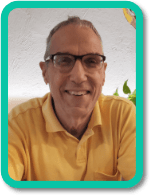
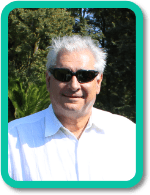
“The Bermuda Institute of Ocean Sciences (BIOS) was honored, and privileged, to host Phase 1 of the NF-POGO CofE. All institutions have turning points in their history. For marine stations, it is frequently a new building, a new ship, a large multi-year grant. BIOS has achieved all of these over the years, but history books will show that BIOS’ role as hosts of NF-POGO CofE was equally monumental. The opportunity to host 10 young, outstanding, ambitious, intelligent, and talented individuals, and we are talking about individuals with a wide range of skill sets and equally wide range of cultures and native languages, can be, and was, a transformative opportunity for BIOS. The term ‘scholars’ was quickly appended to the group (i.e., CoE Scholars, we called them). Read more…
The Nippon Foundation-POGO Centre of Excellence (NF-POGO CofE) provides world class education and training in the field of observational oceanography. The Centre offers a 10-month programme of study, at postgraduate level, to 10 students every year. Information on past cohorts of scholars who attended the Centre of Excellence can be accessed by following the links at the bottom of this page.
From 2008 to 2012, the Bermuda Institute of Ocean Sciences (BIOS) hosted Phase I of the NF-POGO CofE.
During the POGO-9 meeting, special awards were presented to the founders of POGO (Jesse Ausubel, Charles Kennel and Howard Roe, front row right to left).
POGO-9 was hosted by Bermuda Institute of Ocean Sciences (BIOS) from 9-11 January 2008.
MEMBERSHIP: 30 institutions in 18 countries
Following the success of the NF-POGO Visiting Professorship Programme, which ran for 3 years (2004-2007) POGO continued to run a Visiting Professorship programme, which generally funded one Professor every year (2009-2014).
The first of these was hosted by the Iranian National Centre for Oceanography.
POGO and other Oceans United members worked together on an extensive media campaign for GEO-IV in Cape Town, including a video about ocean observing.
SAFARI (Societal Applications in Fisheries and Aquaculture using Remotely-Sensed Imagery), the global initiative to co-ordinate activities on global fisheries and aquaculture research and management using satellite remote sensing imagery, was established in 2007, and in due course entered into scientific interactions with ChloroGIN, IOCCG, POGO and GEO. Initially a task within the GEO Work Plan, it was one of the key ocean elements within GEO that were brought together under the umbrella of the GEO “Oceans and Society: the Blue Planet” initiative in 2012.
In 2007, the POGO Secretariat relocated from Bedford Institute of Oceanography, in Dartmouth, Canada, to Plymouth Marine Laboratory in Plymouth, UK.
POGO Alumnus:
(1) NF-POGO visiting professorship training, 2007; (2) NF-POGO Centre of Excellence 2009 – 2010; (3) NF-POGO regional training in Vietnam, 2011
“…it is obvious that the knowledge, studying, and working capacities I have today were significantly contributed to by NF-POGO capacity building programmes around the globe. From a young newly-graduated bachelor in science, the NF-POGO training programme brought me to a bright research future by helping me to identify a high potential study area – oceanography satellite remote sensing – providing me with a mountain of new knowledge and development in academia community, as well as helping me to establish a network of colleagues and mentors in similar research fields around the world.”
Recollections from Tony Haymet – POGO member (2003-2012) and POGO Chair (2007-2008)
“A few weeks after I started at CSIRO in Hobart, we hosted POGO-4, which Nan Bray had arranged to bring to Tasmania. Bushfires were raging in Hobart and also in Canberra… Read more…
POGO-8 was hosted by Institute of Oceanology, Chinese Academy of Sciences (IOCAS), in Qingdao, China, from 17-19 January 2007
Tony Haymet succeeds Jan de Leeuw as Chair of POGO
MEMBERSHIP: 28 institutions in 18 countries
POGO Alumnus:
(1) Austral Summer Institute 2007; (2) NF-POGO Centre of Excellence 2009-2010; (3) POGO SCOR fellow 2014
“The 2007 POGO-supported Austral Summer Institute (ASI) training course was my first international experience and my first contact with ocean colour remote sensing. I wanted so much to attend this training that I did not mind travelling 60+ hours by bus from São Paulo (Brazil) to Concepcion (Chile). Not only totally worth it but I got myself a funny story I still share these days.”
ChloroGIN was created in 2006 during a workshop sponsored by POGO, GOOS, GEO, IOCCG and PML, and was inspired by the Latin American Network Antares. It aims to promote in situ chlorophyll measurements in combination with satellite-derived estimates. ChloroGIN was funded by the Canadian Space Agency, and was included as a Task within the first GEO Work Plan. It later became a component of the new GEO Task SB01 “Oceans and Society: Blue Planet” (now known as the GEO Blue Planet Initiative).
As an outcome from the POGO-SCOR workshop held in December 2005, an International Cruise Information Database was launched in 2006, to facilitate coordination and volunteer observations.
Initial results were published in Science (12 May, 2006). In this paper, authored by Heather Bouman and others, the bio-optical properties of the phytoplankton are related to the molecular genetic structure of the populations. The global-scale variations in population structure are accounted for by the global-scale variability in vertical mixing.
Reports from selected trainees are available on the Beagle website.
Photo from the Visiting Professorship to the National Institute for Space Research (INPE), Brazil.
POGO Alumnus:
Austral Summer Institute 2006 & 2009
“I had visited Austral Summer Institute for two PhD courses in 2006 and 2009. Both courses provided me excellent opportunities to connect with international researchers and also extend my network to Chile. The course contents were up to date and had a huge impact on my research. I have learned many techniques, and about new, cutting edge findings in ocean biogeochemistry. Among them, the life style of Thioploca spp. large sulfur bacteria – we could see them alive in fresh samples taken just outside the lab, in Conception Bay. The researchers I’ve met supported me later on my career, helping me to apply for grants and design my experiments. Lastly, I have made a lot of friends that I maintain contact until today. I am really grateful to POGO and Austral Summer Institute for these lifetime experiences!”
POGO-7 was hosted by INCOIS, in Hyderabad, India, from 18-20 January 2006
MEMBERSHIP: 26 institutions in 17 countries
Creation of “Oceans United” as a vehicle for various ocean organisations to speak with a common voice within GEO.
During the GEO meeting in Geneva in December 2005, POGO initiated a side meeting of representatives of international organisations which participated in GEO that had an ocean mandate. The goal of the side meeting was to coordinate responses from the ocean community to GEO, to speak with a common voice within GEO, and to share GEO tasks. The response to the idea was very positive, and the group was christened Oceans United by Jan de Leeuw, and it was decided that IOC would be the initial spokesperson for the group within GEO. Oceans United was initiated by POGO, IOC, GOOS, IGOS and JCOMM, but it was recognised that other groups would be invited to participate, to enhance the ocean involvement within GEO.
On 13 December 2005, a one-day workshop took place at NOAA, with the objective, “To improve access to information on past and future research cruises by establishing a comprehensive and user-friendly database and searchable website with information on cruise tracks, types of observations, chief scientist contact information, metadata (for past cruises), project identifier, and berths available”.
Read more…
Supported by POGO and IOCCG
The Latin-American network of bio-optical oceanographers, called Antares, was founded in July 2003 in a workshop in Mar del Plata (Argentina) held at INIDEP. It was financed by a small grant from IOCCG. However, the idea was born at a POGO training course in at the University of Concepción (Chile) in November 2002.
POGO helped to fund the second workshop, which took place at Margarita just before an IOCCG meeting. Further meetings took place, including Brazil 2006; Plymouth 2006.
Antares subsequently led to the formation of a global-scale analogue, ChloroGIN.
POGO continues to collaborate with and provide support to Antares, particularly through its capacity building programmes and the NF-POGO Alumni Network for Oceans.
Adopted by the Partnership for Observation of the Global Oceans (POGO) at their Sixth Meeting at Brest, France, on November 30, 2004.
As GEO was in the process of being formally established, the Communique called for a close working relationship between operational agencies and research communities to be maintained on a continuous basis. It urged that proper scientific and technological expertise, advice and representation be included at the highest level on a permanent basis in the GEO organisational structures as they were being established.
by Jan W de Leeuw (POGO member director 2001-2009 and POGO Chair 2005-2006)
“As director of the Royal Netherlands Institute for Sea Research (Royal NIOZ) I had the pleasure to attend the annual POGO meetings from 2001 (POGO-2) until 2009 (POGO-10) with one exception and more recently the POGO meetings from 2016 (POGO-17) until 2018 (POGO-19) as the NIOZ representative standing in for the present director Henk Brinkhuis, due to extensive reorganizations of NIOZ and its funding body. Read more…
POGO-6 was hosted by IFREMER, in Brest, France, from 29 November-1 December 2004
Jan de Leeuw takes over from Howard Roe as Chair of POGO
MEMBERSHIP: 25 institutions in 17 countries
POGO Alumnus:
NF-POGO Visiting Professorship training, India
“Having a mentor is key to building a successful career in science. The quality of the labs and of the scientists associated with them determines the extent to which young researchers working on their doctoral thesis gain expertise in specific scientific fields. Some young researchers are fortunate to become part of a network where senior scientists, in addition to their PhD supervisors, play a crucial role in their scientific nurturing.”
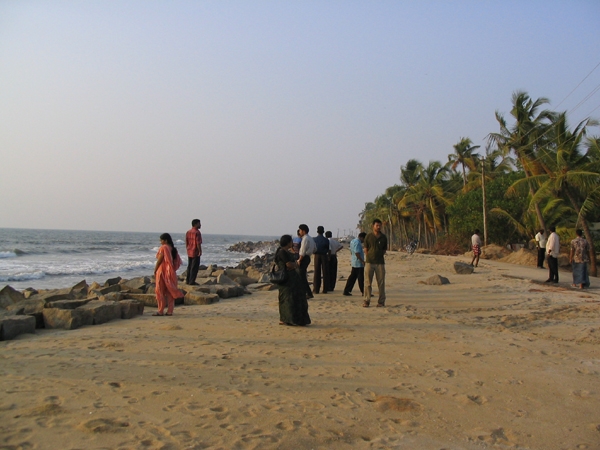
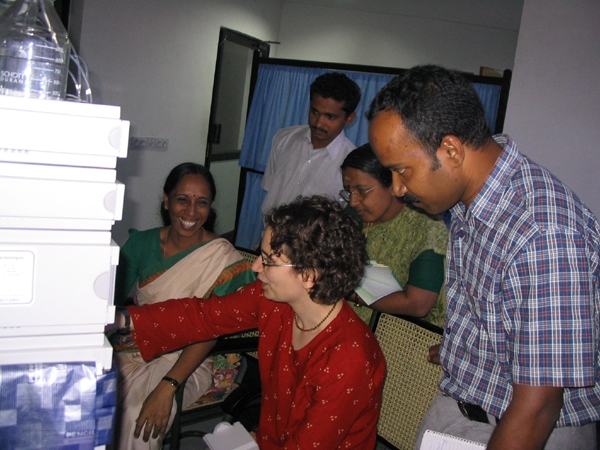
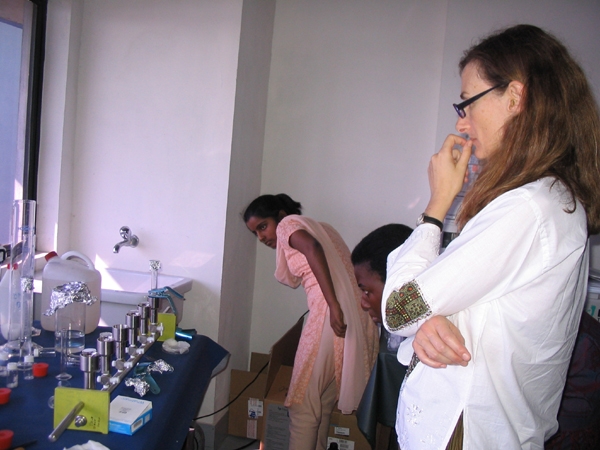
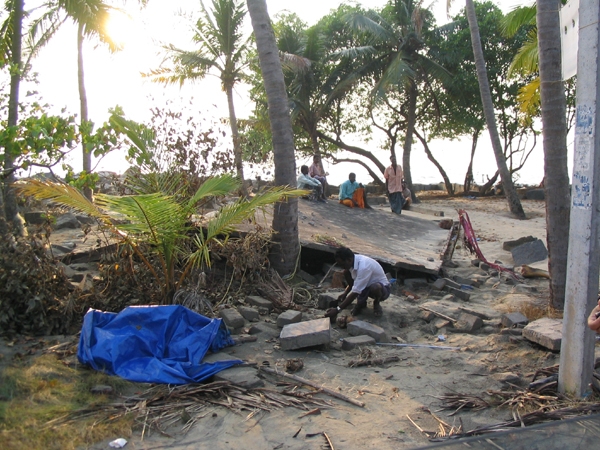
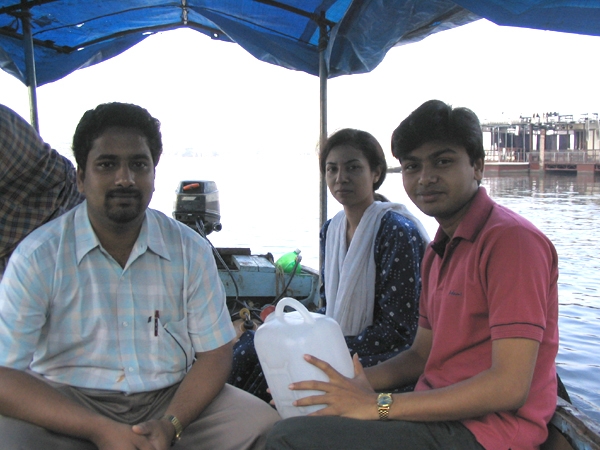
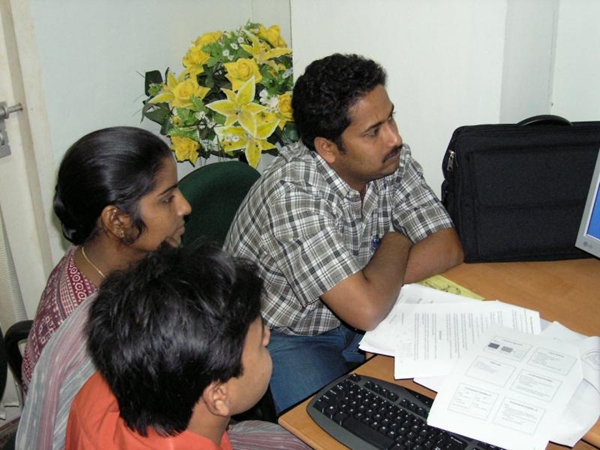
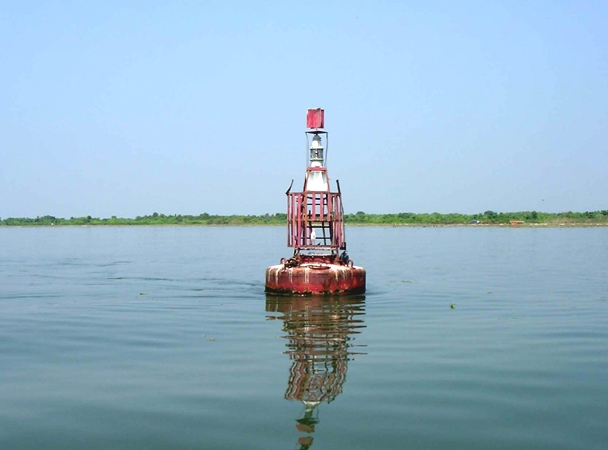
Photos from VP India 2004-2005, courtesy of alumnus Phan Minh Thu
“After I was transferred to the Ocean Affairs Department of The Nippon Foundation in 1999, I had the opportunity to be directly involved in the designing and implementation of the POGO Visiting Professorship (2004~), the NF-POGO Centre of Excellence Scholarship (2008~), and the Alumni Network NANO (2010~).
I first learned of POGO from Mr. Saiki who was working at JAMSTEC at the time. I was drawn to POGO’s diverse geographic membership and the fact that our two organisations had a mutual desire to nurture the next generation of ocean professionals—especially from developing countries. From our initial meeting, I remember how openminded the POGO Chair and secretariat were to our ambitious proposals. Read more…
The Nippon Foundation-POGO Visiting Professorship Programme was initiated in January 2004 as a partnership between POGO and the Nippon Foundation. The Nippon Foundation supports various philanthropic activities in over 100 countries in areas such as overseas cooperative assistance, maritime development (including international capacity and network building projects) and social welfare. Read more…
An outcome of the POGO-5 Meeting in Japan, the Yokohama Declaration was aimed specifically at influencing the discussions taking place within the newly formed Group on Earth Observations (GEO), and urging the GEO members to give high priority to ocean observation activities.
The POGO-5 meeting was hosted by JAMSTEC in Yokohama, Japan, from 18-20 November 2003
MEMBERSHIP: 24 institutions in 17 countries
POGO Alumnus:
(1) Beagle Cruise Leg 3; (2) NF-POGO Visiting Professorship Training in Brazil, 2006; (3) NF-POGO CofE Regional Training in Brazil, 2009; (4) Instructor NF-POGO CofE Regional
“In my case, it’s been 20 years since I started my PhD and looking backwards I realize now how important my training experiences have been and how they shaped my career and life. POGO gave me many invaluable opportunities that marked my career that I still remember. It was in 2003, being a young PhD student, that I participated for the first time in an oceanographic cruise, Leg 3 of the Blue Earth Global Expedition (BEAGLE – 2003), when we sailed from Valparaíso (Chile) to Santos (Brazil). And actually it was the first time in my life that I got on a boat!”
The Blue EArth GLobal Expedition (BEAGLE), an international circumpolar cruise in the Southern Hemisphere, was organized by JAMSTEC (Japan Agency for Marine-Earth Science and Technology) to commemorate the 30th anniversary of its establishment. The expedition took place on board the RV Mirai, one of the largest research vessels in the world. The project was comprised of six legs, each approximately four weeks long, commencing in Brisbane, Australia on 3 August 2003, and ending in Fremantle Australia on 19 February 2004. The cruise was designed to enhance research activities in the Southern Hemisphere, in accordance with the São Paulo Declaration, drawn up at the 2nd meeting of the Partnership for the Observation of the Global Oceans (POGO) held in Brazil in 2000.
FIRST EARTH OBSERVATION SUMMIT (EOS-I): meeting on 31 July 2003 in Washington, DC, US, high-level representatives of 34 governments adopted a declaration establishing the ad hoc intergovernmental Group on Earth Observations (ad hoc GEO), co-chaired by the European Commission, Japan, South Africa and the US to draft a 10-Year Implementation Plan.
POGO recognised as a contributing organisation with a unique role to play, particularly with regard to representing in situ ocean observing.
“The Partnership for Observation of the Global Ocean – POGO – has been instrumental in the development and agenda-setting of GEO since its inception. Indeed, as a key Participating Organization (PO) in GEO, POGO has shown leadership in raising awareness of the need for coordination and open access to ocean and marine observations, especially in the absence of a Societal Benefit Area dedicated to ocean observations. POGO has long recognized the power of the integration of multiple types of observation data and knowledge to provide comprehensive information about the world’s oceans. Read more…
says Howard S.J. Roe, Co-Founder of POGO, POGO member and Chair (2003-2004)
“The entry for May 11 1998 says-“lunch 2pm/dinner Director of Scripps”; for 26 September 2011 it reads “Abingdon POGO”. These two entries bookend my involvement with POGO – thirteen exciting, interesting and often frustrating years.
“The meeting in 1998 was my first with Charlie Kennel who visited Southampton to discuss the possibility of creating a new organisation for the world’s oceanographic institutions. Read more…
The POGO-4 meeting was hosted by CSIRO in Hobart, Tasmania, Australia, from 22-24 January 2003.
One of the outcomes was the agreement that an ocean assessment (similar to IPCC for climate) it needed.
2nd Chair of POGO, Howard Roe, takes over from Charlie Kennel
MEMBERSHIP: 24 institutions in 17 countries
POGO Alumnus:
POGO-SCOR Visiting Fellowship, 2002
“In December 2002 thanks to a POGO grant, I flew to Dakar, Senegal to board a French research vessel and participate to the PIRATA FR 11 cruise whose main mission was to recover and replace five Atlas moorings in the Tropical Ocean Atlantic. This participation turned out to be a key element in the extension of PIRATA in the South East Atlantic Ocean at 8oS 6oE.”
A POGO-CoML-UdeC Workshop on Biodiversity in the Waters around South America, 28-30 October 2002
POGO/IOC/SCOR joint initiative to promote intelligent and sustainable use and management of the ocean, through collaboration among major oceanographic institutions, capacity development and advocacy – approved and included in WSSD
View the Report of the World Summit on Sustainable Development here.
The Austral Summer Institute, hosted by the University of Concepcion, Chile, as part of the UNESCO Chair programme, was established in 2001 and was supported by POGO until 2014, and again in 2018. The second ASI focussed on Physical Oceanography, specifically the following topics:
- Processing of data obtained with a towed stream acoustic profiler
- Physical oceanographic data analysis with emphasis on the South Pacific ocean
- Numerical techniques for oceanographers
- Numerical models of ocean processes The ocean response for severe storms
During ASI II, research carried out by lecturer and students resulted in a scientific publication: Wind-induced exchange at the entrance to Concepción Bay, an equatorward facing embayment in central Chile. 2004. Valle-Levinson, A., Schneider, W., Sobarzo M., et al., 2004. Deep-Sea Research II 51, 2371–2388. DOI: 10.1016/j.dsr2.2004.08.010.
The POGO-3 Meeting took place at White Point beach resort, Nova Scotia from 27-29 November 2001.
MEMBERSHIP: 20 institutions in 14 countries
POGO Alumnus:
(1) POGO-SCOR Visiting Fellowship, 2001; (2) NF-POGO Visiting Professorship Training, India
“I was fortunate to be selected for the POGO-SCOR fellowship in 2001 for training in Bedford Institute of Oceanography under the able guidance of Prof. Trevor Platt. As a Scientist with Space Application Centre of Indian Space Research Organization, I had started to work on two projects related to the estimation of bio-optical properties and primary production using ocean color data. The fellowship came at the right time since my knowledge on the marine optics was limited.”
From the onset, POGO focused strongly on the need for improved monitoring of marine life and their interactions with their physical and chemical environment. To address the lack of a system for sustained, long-term, monitoring of marine biota and biological processes at the global scale, POGO convened a Biology Meeting to explore the requirements of such an observing system, and to recommend step-wise and organised implementation of elements of such a system, through the POGO institutions. Read more…
2001 was the first year of the POGO-SCOR fellowship programme, with SCOR and IOC
This programme is jointly funded by POGO and the Scientific Committee on Oceanic Research (SCOR) and is designed to promote training and capacity building leading towards a global observation scheme for the oceans
by Ed Urban (former SCOR Executive Director) and Patricia Miloslavich (current SCOR Executive Director)
The Scientific Committee on Oceanic Research (SCOR) and Partnership for Observation of the Global Ocean (POGO) have been working together since POGO’s formation. First, the organisations have sent representatives to each other’s annual meetings to help provide input in person. These events helped the organisations learn about the activities and priorities of each other to make cooperation more effective. I attended five POGO annual meetings. Read more…
At the POGO-2 Meeting, much of the discussion focused on the need for improved observations of the oceans in the Southern Hemisphere. Many of the challenges that face mankind today (climate change, collapsing fisheries and rising sea level, to name only a few) are global in scope. Our response to these challenges must be based on knowledge of how the world oceans act as a system. Yet, the oceans remain grossly undersampled, and the Southern Hemisphere much more so than the Northern Hemisphere. The issue cannot be addressed without recognising a geopolitical reality: most of the oceans are in the Southern Hemisphere, and most of the major economies in the Northern Hemisphere. A concerted effort at the global level is needed to solve this problem. A key result of the deliberations at POGO-2 was the São Paulo Declaration, which was adopted unanimously by all the participants at the meeting.
POGO was registered as Not-for-Profit Society in Nova Scotia, Canada, in April 2001
Scientific Educational Resources and Experience Associated with the Deployment of Argo profiling floats in the South Pacific Ocean (SEREAD) is an educational program and resource that provides regionally relevant and focused ocean science that is built upon Argo data in a format that fits directly into existing curricula of Pacific Island schools.
POGO co-sponsored this initiative, together with a number of other organisations, until 2007.
Early on, POGO established a WG focusing on fixed point time-series stations, and on the establishment of a network of open-ocean, fixed-point, time-series observations. This was very much seen as a complement to the Argo programme, and the POGO members agreed to collectively support the network of deep-ocean time-series stations that would later become known as OceanSITES.
Bob Weller, who was a member of the Time Series WG, and for many years a representative of OceanSITES within POGO, provides some recollections of his time in POGO and of how POGO helped support international cooperation and the establishment and long-term success of OceanSITES. Read more…
POGO-2 was hosted by Instituto Oceanografico, Universidade de São Paulo, Brazil from 29 November-1 December 2000.
The first POGO elections took place, with Charlie Kennel elected as Chair.
MEMBERSHIP: 16 institutions in 13 countries
During the creation of POGO in 1999, the world’s oceanographic leaders envisioned a strong communications component to support the mission of POGO and to keep its audiences informed about POGO’s activities. The News & Information (N&I) group was formed to unify all partner institutions, to promote the need for global ocean observations, and to create communications strategies, programs, and products to support POGO initiatives. The POGO N&I team is comprised of the key communications specialists from POGO member institutions, and serves as every POGO member’s connection to POGO’s global activities.
The concept for the Census of Marine was being developed around the same time as the concept for POGO (see Jesse Ausubel’s recollections). It was envisaged from the outset that “an organization like POGO will be absolutely essential for the success of the Census of Marine Life” in the words of Jesse Ausubel, who was instrumental in the establishment and success of both initiatives. From the outset, POGO had a strong focus on biological observations, and obtained a grant from the Sloan Foundation to organise a workshop in 2002 on biodiversity in South America, jointly with CoML. The aim of the workshop was “to assess what is known and unknown about biodiversity in the oceans around South America”. The workshop was instrumental in organising the South American participation in CoML, for example through the establishment of a South American CoML Steering Committee and the decision to establish a South American node for the Ocean Biogeographic Information System (OBIS). POGO and CoML also teamed up in 2007 to produce two videos for the Group on Earth Observations (GEO) Ministerial Summit, once again with funding from the Sloan Foundation. One was on ocean observations for societal benefit, and the other on marine biodiversity observations. To find out more about the beginnings of CoML read this article published in Oceanography by Jesse Ausubel in 1999.
At the time that the Argo programme was just beginning, one of the first priorities of POGO was to throw the collective weight of its members behind the concept and the world expansion of Argo. Because the members of POGO are directors with the power to commit resources and influence decision makers, a resolution to accord full support to Argo had immediate effect, and the distribution of floats around the world ocean improved rapidly.
Scripps hosted the first formal meeting of POGO in early December 1999. This inaugural meeting included senior officials from 17 institutions in 12 countries (Australia, Brazil, China, France, Germany, India, Japan, Korea, Norway, Russia, UK, and US), as well as representatives of the IOC, the Scientific Committee for Oceanic Research (SCOR) of the International Council for Science (ICSU), the Committee on Earth Observation Satellites (CEOS) and several international scientific programs. Read more…
MEMBERSHIP: 13 institutions in 10 countries
– Scripps Institution of Oceanography, USA –
Having worked on international collaboration in space-based Earth observations at NASA, Charlie Kennel, upon his arrival at Scripps in 1998, aspired to help create a mechanism for promoting international collaboration in global ocean observations and research. He recruited Lisa Shaffer to Scripps, who had headed the international efforts in earth science at NASA and previously at NOAA. POGO was one of the first things they worked on together. Read more…
In March 1999, the Directors of Scripps Institution of Oceanography, Woods Hole Oceanographic Institution, and the Southampton Oceanography Centre in the U.K., convened a planning meeting in the headquarters of the United Nations Intergovernmental Oceanographic Commission (IOC). This meeting confirmed the value of creating a new partnership and defined the initial mission statement and terms of reference.
MEMBERSHIP: 8 institutions in 6 countries
by Jesse H Ausubel, Director, Program for the Human Environment, The Rockefeller University, and Chair, Richard Lounsbery Foundation
“During 1997-1999 I was conducting feasibility studies for the Alfred P. Sloan Foundation for the program that would become the Census of Marine Life (CoML), a global effort from 2000 to 2010 to assess and explain the diversity, distribution, and abundance of marine life. Sloan required the studies to address a trio of questions: Should the Census happen? Could it happen? And, would it happen? Read more…

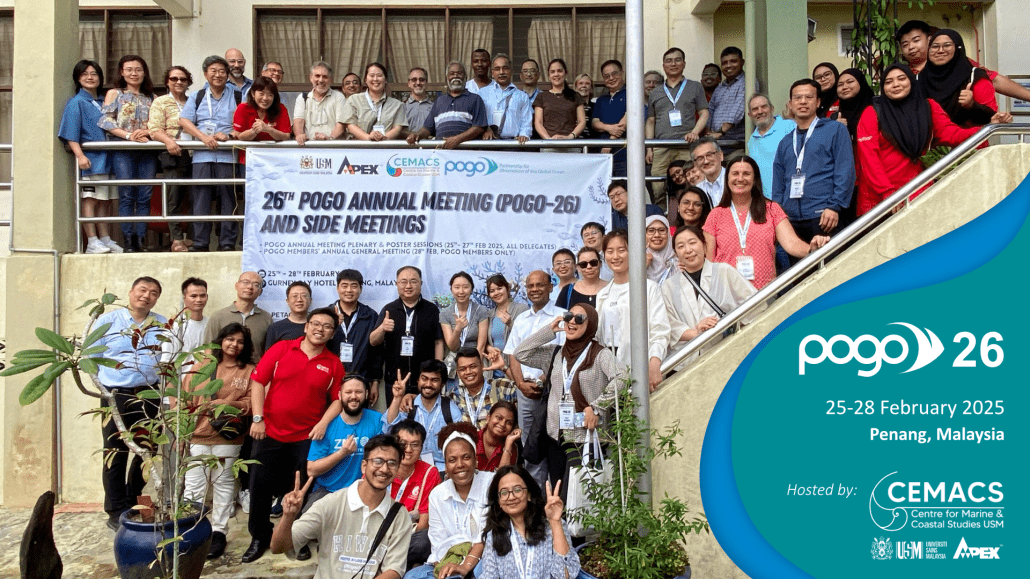
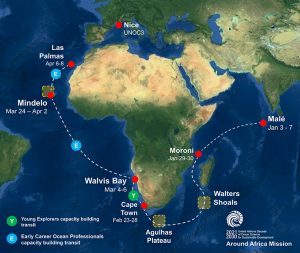
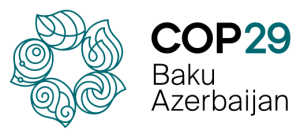
![[IMAGE: The Nippon Foundation-POGO CofE in Observational Oceanography Scholars at the program launch event (photo credit, The Fisheries and Marine Institute of Memorial University): (L to R) Back row Dr. Ndague Diogoul (Senegal), Obed Omane Okyere (Ghana), Dennis Otieno (Kenya), Ni Putu Asri Ratna Suhita (Indonesia), Maryjune Cabiguin (Philippines), José Manuel Echevarría Rubio (Mexico) Front row Md Shahadat Hossain (Bangladesh), Punya Puthukulangara (India), Dr. Esraa AbouElmaaty (Egypt), Ana JuÌia Alves de Lima (Brazil)]](https://pogo-ocean.org/wp-content/uploads/2025/04/2024-25CofE-cohort.png)
